#Mha critical
Explore tagged Tumblr posts
Text
i don't like the growing opinion that people are being 'too hard' on deku for his failing to save shigaraki.
i've seen quite a few people complaining that a lot of the bnha-critical crowd are being too mean to deku for getting tomura killed, arguing that it isn't really his fault, and that hes a 16 year old child soldier who's been failed by almost every adult in his life, why should we be putting all of this on his shoulders? hes just a kid after all?
and the truth is, they're right. deku IS a 16 year old boy whos had the fate of the world thrust on his shoulders. but the story itself just plainly refuses to acknowledge this.
the narrative doesn't acknowledge how fucked up having a school that trains literal children how to be combo cop-celebrities is. it only tentatively acknowledges the fact that a universe having combo cop-celebrities is fucked up, and even then the only people who ever point this out are antagonists, who are portrayed and treated in-universe as untrustworthy. the narrative doesn't care how fucked up dekus circumstances are. the narrative treats deku like hes a fucking messiah here to touch the hearts of the evil depressed villains with his magical empathetic heart of gold before they get blown up or just sent to fucking superhell for daring to challenge the status quote.
deku isn't a person. he's barely even a fucking character at this point. he's a plot device, and a mouth piece for the objectively shitty themes bnha is trying to spout. the themes that tell you that if you're mistreated by society and want to do something about it, you're a villain. that disrupting the status quote and refusing to repent to some random teenage boy spouting empty platitudes at you means you deserve to get sent to fucking superhell. the themes that portray people fighting for civil change as mass murdering supervillains. the themes that look the audience dead in the eye and can call deku the greatest hero to ever live.
deku, who barely spared a second thought to lady nagant telling him the truth about the hero commission. who spouts meaningless platitudes about heroism and morality at nagant, and aoyama, and toga and shigaraki, when even the thought that he should question the world around him comes up. who's constantly talked about as this truly kind, empathetic person, but hasn't spared an empathetic thought to literally anyone who is classified as a villain. who listened to every authority figure around him except the ones who asked him to question his worldview. who saw la bravas tears, shigarakis various breakdowns, himikos plead for understanding, chisakis catatonic state, lady nagants truth, and barley batted a fucking eye. deku, who killed tomura shigaraki.
people don't criticize deku for failing shigaraki because they just hate deku. people criticize deku because of what he represents. because hes a mouthpiece for the atrocious morals and themes of this ideologically rotten manga. because any character he had was chopped up to bits in favor of the incomplete husk we have now. people criticize deku because hes the main character of my hero academia. theres nothing more damning then that.
#my post#bnha#bnha critical#izuku midoriya#midoriya izuku#sorry if this sounds really angry. i mean i am very angry at bnha for being such a nothing burger of empty platitudes and wasted potential#but like. that was extremely predictable#bnha wanted to be more than it was willing to put effort into being and so now its just. worthless#so this is just kinda a vent on all my angry feelings abt dekus failure as a character and a protagonist#tomura shigaraki#my hero academia#boku no hero academia#mha critical#my hero acedamia critical#boku no hero acedamia critical#deku#bnha meta#i mean techinally#mha#mha meta#bnha manga spoilers#bnha manga#long post#well longish
1K notes
·
View notes
Text
It always bothers me when fans mock or make fun of critics/antis for constantly making posts venting their grievances about a story they dislike and say shit like “oooh why can’t u just talk about something u like11” or “pfft, get a life and do something more productive than complaining about a show!” and plenty of other shit.
Not only does this come across as condescending, it’s also hypocritical. So if people aren’t allowed to make posts about things they don’t like…I guess that means that fans can’t make posts about things they do like. I throw these same arguments fans use against people who complain about something that’s enjoyed by a good amount of people. “OMG why do you care so much about a stupid show” and shit like that.
Fans like these don’t realize that the reason for why people talk about things they don’t like is the same reason for why people talk about things they do like; they are passionate about it and enjoy analyzing it. They like breaking it down because they just enjoy media analysis. It’s not unhealthy, it’s not obsessive, it’s just a perfectly normal way of consuming media. And critical communities on Tumblr allow for a safe space for people to voice their grievances about a piece of work without being harassed by deranged stans.
My point is; let people make blogs criticizing shows whenever the fuck they want. What they are doing is no different than what fans of the work are doing; analyzing the story and voicing their opinions.
#vivziepop critical#hazbin hotel critical#vivziepop criticism#helluva boss critical#toh critical#mha critical#spop critical#arcane critical
366 notes
·
View notes
Text









my growing collection from redacted dot com 🥲
#seriously this shit sucks so much ass#i just can’t believe a series i loved so much that brought me so much joy is wrapping up in the way it is#truuuuuly my fumble academia#maybe i’ll try to write out more thoughts about it at some point but for now it’s just sooo disappointed#like amazingly so#bnha#mha#bnha critical#anti mha#anti bnha#mha critical#shigaraki tomura#tomura shigaraki#tenko shimura#shimura tenko#my stuff#bnha manga spoilers
646 notes
·
View notes
Text
i was never as optimistic about the ending of bnha as some villain stans were, but i never thought it'd end so badly it left me wondering why horikoshi ever bothered to humanize the villains or make them complex characters at all.
like-- i expected that at least 1-2 of the 3 villains who were heavily foreshadowed and outlined by the narrative as people to be saved would be, you know, actually saved. i didn't think that was a high bar. i've been let down before in fandoms where everyone was certain a character would live and then they didn't, so i tried to keep my hopes low. AND YET.
what happened to tomura was upsetting, but i wasn't that shocked after how disinterested the manga has seemed to be in him for like, the past 100 or so chapters. a bit surprised, because you'd think if anyone would succeed in the 'saving' mission it would be the MC, but whatever. dabi, well, they've spent a lot of time showing the way his quirk destroys his body even before this arc, so that also sucked but at least it didn't feel completely out of left field.
........but they're not even letting toga live???
i just-- what have we even been doing here? when zero out of the 3 characters that were marked out for saving were actually saved, you have to acknowledge that something has gone seriously fucking wrong with the storytelling. not even just from the perspective of a villain fan but from the perspective of someone who likes stories to be thematically consistent or satisfying in any way.
you can set up an expectation of these characters being saved and then subvert that and turn it into a tragedy- if done well that could even be worthwhile and interesting. but you can't turn it into a tragedy and then just... keep trucking along with the happy ending messaging and act like anything in the manga has been resolved and that the characters have somehow successfully completed their heroic origin stories.
like, maybe i shouldn't have expected this much from a shounen- at the end of the day it is still a shounen so i didn't expect to feel that it truly satisfactorily wrapped up all the themes it brought up around societal ills. but i expected it to at least resolve those things in a shounen-y way where they punch the problems and help these specific people and then you can feel good assuming that the state of things will continue to improve in the post-canon world of the manga.
instead we got... uh, none of that. the story refused to answer a single one of the larger questions it's been outlining for the past 400+ chapters. in the end, it was all flash and no substance, which again could've been fine, if it weren't for the way the story seemed to spend significant chunks of time trying to delude you into thinking it had substance.
truly makes me wonder what horikoshi thought he was doing the entire time. can it really all be blamed on burnout? the most that can be said for this ending is that it is, well, an ending. fuck dude, it is that.
and that's just... such a sad way to end a project that took up 10 years of your life.
#bnha critical#mha critical#bnha leaks#bnha spoilers#bnha 429#made a post like this earlier on main and then deleted it btw#in case you are one of like 3 people who could potentially recognize the repeated lines#Or maybe the questions do have answers they're just answers that i hate? But that's the part that leaves me wondering#Why spend so much time humanizing the villains in the first place if you were going to go that route???#Truly i don't get it.#bnha#ok i know dabi isn't technically dead yet but there's still another chapter left for horikoshi to finish nailing that coffin 🤪
612 notes
·
View notes
Text
JASON TODD VS. DABI: WHY NOT ME?
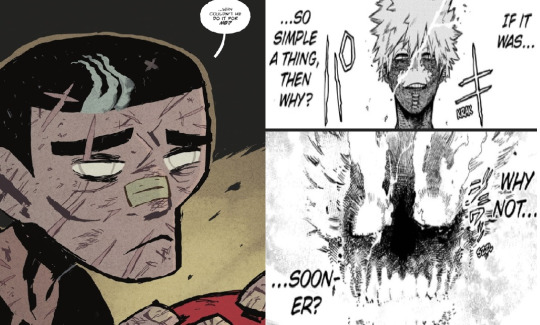
"You haven't been here long but you've seen him, right? The batman. The batman. He lives in darkness, to find the helpless and bring them into the light. So I have to wonder...why couldn't he do it for me?" The Boy Wonder: Issue #2
This is the story of the boy who didn't get saved. The story of a boy who really ought to have been saved. Of course, every victim deserves to be saved, but this boy was the son of a superhero. Can a hero who saves everyone, but fails to save his own son really be called a hero? As for the son, how does it feel to watch his father save complete strangers but let him fall to the wayside?
Jason Todd and Dabi are two characters with similar backstories and motives (so similar it's possible Dabi is outright based on Jason Todd) which are worthy of comparison. These are two tragic arcs which explore the conflict between a hero's responsibility to act as a father, and their responsibility to save people. As I said they are tragic because in both cases the hero fails, as a father, and a hero. However, I'm comparing the two because Jason Todd's story is a well written tragedy, and Toya's story is not.
If you were to write a story of my life, it would surely be a tragedy.
Aristotle's Poetics is the first attempt to define what Tragedy is, not as a story where sad things happen but a specific story structure. He outlines not only what makes tragedy, tragedy, but also what makes a good tragedy.
The Plot, then, is the first principle, and, as it were, the soul of a tragedy: Character holds the second place. A similar fact is seen in painting. The most beautiful colours, laid on confusedly, will not give as much pleasure as the chalk outline of a portrait. Thus Tragedy is the imitation of an action, and of the agents mainly with a view to the action.
I use this quote because the painting metaphor is a great way of explaining what I'm getting at, you can have a painting with the most wonderful colors, you can have a story with really good ideas like the Todoroki family plotline but if you don't use those colors correctly all you're going to end up with is a bad painting.
In poetics Aristotle clearly defines a tight well-structured plot as the first priority for effective tragedy, character as second.
Again, a beautiful object, whether it be a living organism or any whole composed of parts, must not only have an orderly arrangement of parts, but must also be of a certain magnitude; for beauty depends on magnitude and order. Hence a very small animal organism cannot be beautiful; for the view of it is confused, the object being seen in an almost imperceptible moment of time. Nor, again, can one of vast size be beautiful; for as the eye cannot take it all in at once, the unity and sense of the whole is lost for the spectator; as for instance if there were one a thousand miles long
To make sure you understand, it's vital in tragedy for all the pieces to fit together. Tragedy is a specific story format. Good tragedy uses the parts of a story well, but bad tragedy is sloppy and poorly put together. In tragedy, the whole has to be greater than the sum of its parts. The Todoroki Family are all good characters out of context, but the story could have enhanced their characters but detracted from them due to how poorly it is told. The fact that a lot of MHA fans are in love with the Todoroki family out of the context of the story, but also have constant complaints for how Horikoshi handles their plotlines is, in my opinion, very telling.
What Aristotle goes on to posit is the best tragedies do not come about by accident, but rather by the direct actions of the characters.
But again, Tragedy is an imitation not only of a complete action, but of events inspiring fear or pity. Such an effect is best produced when the events come on us by surprise; and the effect is heightened when, at the same time, they follow as cause and effect. The tragic wonder will thee be greater than if they happened of themselves or by accident; for even coincidences are most striking when they have an air of design.
Therefore Tragedies require consequentialism, like Newton's Third Law, every action will have an equal and opposite reaction. To simplify a good tragedy arises from the consequences of the character's actions (or inaction). The most basic form is that the hero of the story will have a tragic flaw that they fail to improve upon in time and then leads to their destruction. In essence, tragedy is where the hero fails. Not only does the hero fail, but the hero loses, and that irreversible loss is what defines tragedy. Medea slays her own children, Oedipus rips his own eyes off and deserts his kingdom, Creon Antigone is buried alive and Creon's son, her fiancee, commits suicide.
These events share two things in common, they are irreversible (hence why they feel like good endings), and two they evoke catharsis. Aristotle defines the goal of tragedy to evoke terror and pity. We feel alongside these heroes, Medea was abandoned by the husband Jason who she left her home and slaughtered her own brother for, Oedipus did all of his crimes unwittingly and is a victim of fate, Antigone was doing the right thing by burying her brother so his soul could pass on to the afterlife.
There's all different sorts of tragedies, Hamliet explores more here. I'd say UTRH and Hellish Todoroki Family are tragedies centered around grief.
Tragedy works on extreme emotions, and extreme hard-hitting consequences to the hero's failures. The worst thing a tragedy can be is boring.
The Tragic Hero
Now that I'm done lecturing you let's actually talk about both My Hero Academia and Batman like I promised. Both of these stories don't actually feature the central victim as their protagonist, and that is a feature not a flaw.
Rather, the story we are being told is that of a tragic hero, failing to save a tragic victim because of their own personal flaws.
These flaws are called (hamartia) or "error in judgement". A hero, being called a hero of a story is often unaware of his flaws which is central to what makes them unable to fix those flaws in time. That flaw can later lead to a moral failing, such as Othello's jealousy, initially jealousy is an understandable emotion, but then it leads to him trusting Iago over his own wife and killing his wife in a rage.
Most importantly, the hero’s suffering and its far-reaching reverberations are far out of proportion to his flaw.
Let's begin with talking of the heroes and their flaws, Batman and Endeavor. My main reason for comparing these two is in these specific stories they have the same flaw, inability to move past their personal guilt towards their son, and the same conflict the duty of a father versus the duty of a hero.
However, Batman functions as a tragic hero, and Enji does not. The summary of their conflict is right here in these two panels.
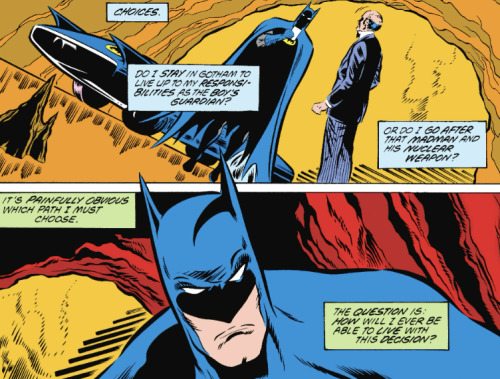
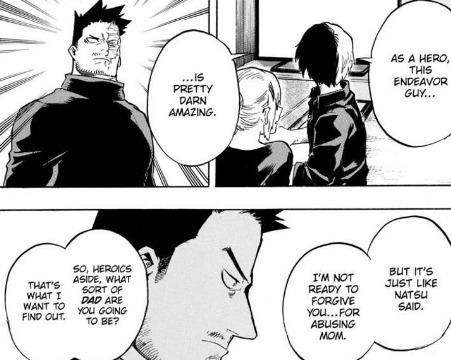
A parent is required to place their children above everything else, because they are the ones responsible for bringing that child into the world. Bruce Wayne made the decision to adopt Jason. Enji made the decision to have children, however with Enji you have the added insidious motivation of he only wanted to make designer babies and just didn't care for the ones who didn't turn out right.
Bruce attempts to do both, to act as a father for Jason and also a crime fighter as batman but he can't do both. This comes to a head in Death of the Family when Jason is having serious trouble because of his lack of a strong parental figure, and Bruce knowing that Jason is in trouble chooses still to go off and fight crime instead of staying with him. The choice to place crimefighting over the child they chose to take responsibility for has the unintended consequence of getting that child killed.
Whereas Enji makes the same choice over and over again, ignoring Toya's clear troubles at the fact his father no longer spends time with him and choosing to run away to the world of heroes because he doesn't want to face the fact that his actions are severely hurting his son. Bruce's motivations are more sympathetic admittedly he wasn't actively practicing eugenics, but the choice is the same and the consequences are the same.
Both Bruce and Enji are forced to bear witness to the deaths of their children when they are not there, specifically because they made a choice to be a hero instead of staying by their child's side. A situation directly caused by their choice to be a hero over a father, and a situation that would have been avoided if they had stayed with their child in their time of need. Jason runs off when Batman tells him to stay and gets kidnapped by the Joker, if Enji had been on Sekoto peak that day Toya would never have accidentally lost control of his fire.
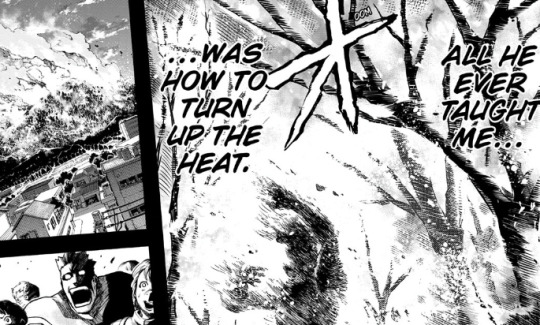
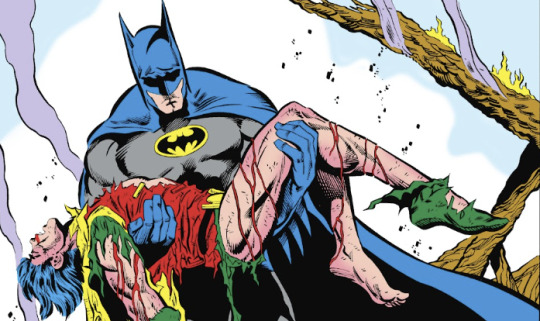
This is just the backstory however, the main event that kickstart this plot is the unexpected return from the dead of both Jason and Dabi. Each story follows the same plot beats. A new villain appears to challenge Endeavor / Batman. The villain reveals themselves as their dead son. Both Endeavor / Batman are given a chance to try reaching out to their sons, but they choose not to.
Then even though they are given a second chance with a miracle of a dead son coming back to them, they choose the exact same thing they chose before, being a hero and because of that the tragedy repeats itself. For both of them they are unable to save their son again, and the son goes through a second death. History repeats itself, the lesson isn't learned.
Their fatal flaw is their guilt. This is a story about grief and mourning after all, a son who is died, buried, but never grieved properly, never mourned, an open wound on the father suddenly coming back. The inability of each to process their grief blinds them from seeing the fact the son has come back, and they have a second chance.
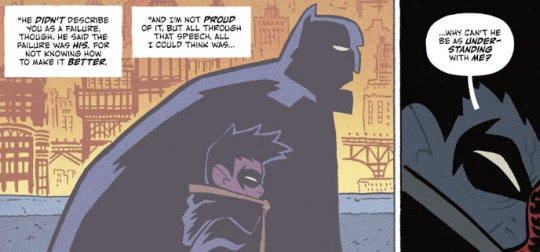
Toya has internalized he is a failure, because Enji literally called him that. Jason believes that Batman thinks he is a failure. In both cases the father is the one who failed, Bruce at least acknowledges this but cannot communicate it in any way shape or form.
This guilt and responsibility both Enji and Bruce feel causes them to self-sabotage. They no longer have the confidence they are in the right (they no longer feel like heroes because they have failed to be heroes to their own son).
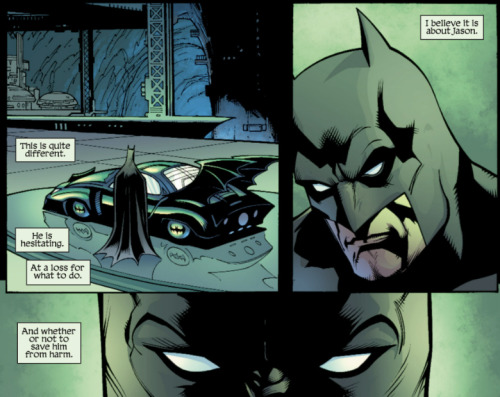
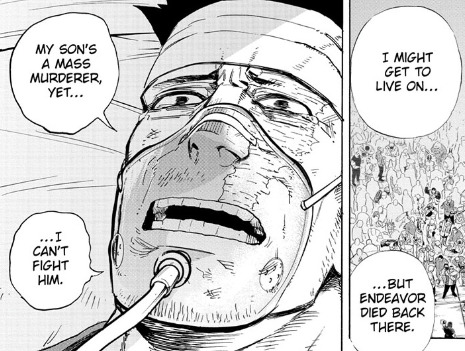
You can also add the layer of complication that since both men chose to be heroes in the past, they do not know how to handle the situation as a father now that they're being challenged to step up as one. Unfortunately, they are not the fathers that stepped up.
The reason their grief becomes a flaw is because they put their grief over their victims. . Each man is aware too much of their own failure, and while they should feel guilty they make the classic mistake of placing their own guilt over the feelings of the victim. The guilt they feel for causing the death and the genuine grief of losing a son is given priority over Jason and Dabi who you know... actually died.
An overwhelming grief and guilt is understandable because grief is a messy and human emotion, losing a child is an unimaginable tragedy that should never be inflicted on anyone.
Yet at the same time both Dabi and Jason are grieving to. This paradox that Batman only thinks of his own grief at losing a son and never stops to think about how Jason must feel leads to one of the best lines in Under the Red Hood.
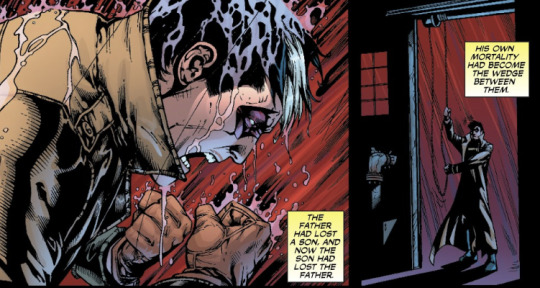
"The father had lost a son, and now the son had lost a father."
Batman's guilt is so strong over being the cause of Jason's suffering, that the suffering of the victim himself is ignored. To be fair to My Hero Academia, the Todorokis say a similar line to Enji.
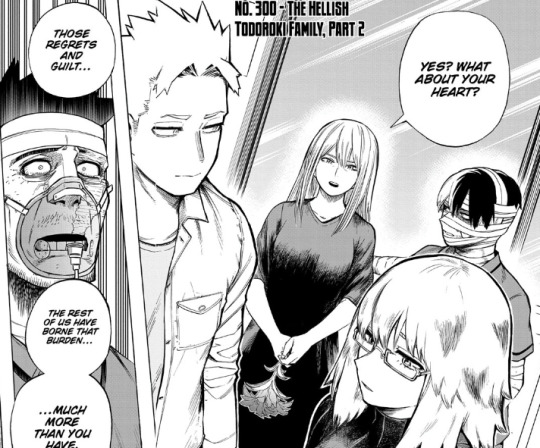
However, this is where I begin to get into the difference between ideas and execution. Tragedies are stories of actions and logical consequences, every action has an equal and opposite reaction in Under the Red Hood. Batman is punished for the choices he makes, the choices he doesn't make, and the choices he fails to make in time.
The Todoroki plotline features almost none of its character making any choices of substance, and because of that the plotline says the right things over and over again, but it all comes off as tell don't show.
I'm going to quote @codenamesazanka's post right here a couple of times because they describe the complete failure of the Todoroki plotline to show us a reason why we should be feeling things for the characters artfully.
We've heard Enji say this before - I'm sorry, I intend to atone. It's indeed the right thing to say, it's exactly what he should be saying and acting. Natsuo is declaring no contact - That's fine, I'm sorry, I accept this as part of my atonement and will continue. Touya calls him a coward - That's fine, I'm sorry, I accept this as part of my atonement and will continue. The public hates him - That's fine, I'm sorry, I accept this as part of my atonement and will continue. But you can only hear this so many times before you want to snap and beat the character, the story, the writing over the head with Enji's wheelchair. Why is that? He's behaving exactly as he should, and yet...
The reason why it fails to evoke strong feelings is because of what we'd called "narrative dissonance." The actions of Bruce and Enji are the same, they both neglect to do anything, make any real attempts to reach out to their victims because they're paralyzed by guilt.
However, we are told that they have entirely different arcs. Bruce's arc is a tragic fall. He's failing as a hero. While we are being told that Enji is experiencing an arc of atonement. Enji is supposed to be improving himself, and Bruce is supposed to be experiencing negative character development but they both do the exact same thing in story. Bruce neglects Jason, we are told by the story, by the characters in the story that Bruce is failing Jason. Enji does nothing in time to actually atone for Toya or try to help him, yet, we are told again, and again, and again, and again, and again, and again that Enji is atoning with nothing substantive to show us this is the case.
To show what I meant instead of telling this scene is in chapter 252.
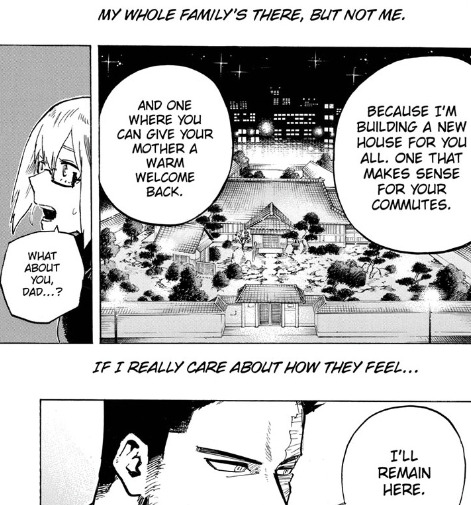
This scene is the ending point in chapter in chapter #426.
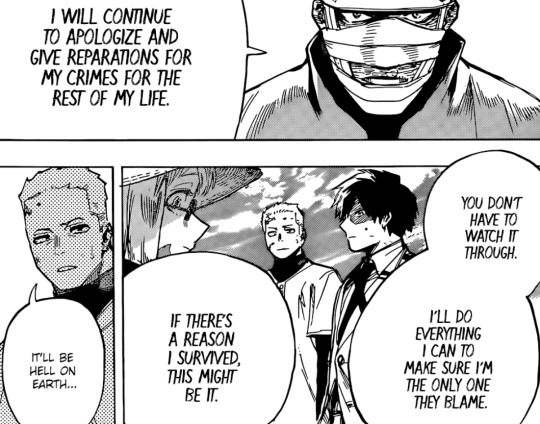
It's just him repeating the exact same sentiment and yet in a more than 150+ chapter gap, Enji never made any action to show he was now placing his family first. Enji didn't say anything to Dabi when he revealed himself as Toya. Enji didn't look for Toya in the months before the final war arc. Enji literally appeared on live TV in a broadcast that Toya was watching and said the very selfish "Watch Me" atone for the crime of creating Toya instead of literally talking about Toya or too Toya. Well, that would have rocked the boat too much... THAT IS LITERALLY THE POINT. Enji had to somehow break from tradition or make some significant sacrifice onscreen to his social standing to show that he's willing to put his family first. Enji decides to go along with Hawks decision to not face Toya head on, making the decision to be the hero for the final time which directly causes Toya to get up after Shoto brings him down non-lethally and make one last attempt to suicide bomb for his father's inaction.
Bruce does nothing for a long time in Under the Red Hood. He ignores his initial instinct that Jason came back and instead makes a long investigation on whether or not someone can come back from the dead in order to distract himself. When Jason takes the mask off, Batman already knew but was pretending otherwise because he didn't want to face the reality.
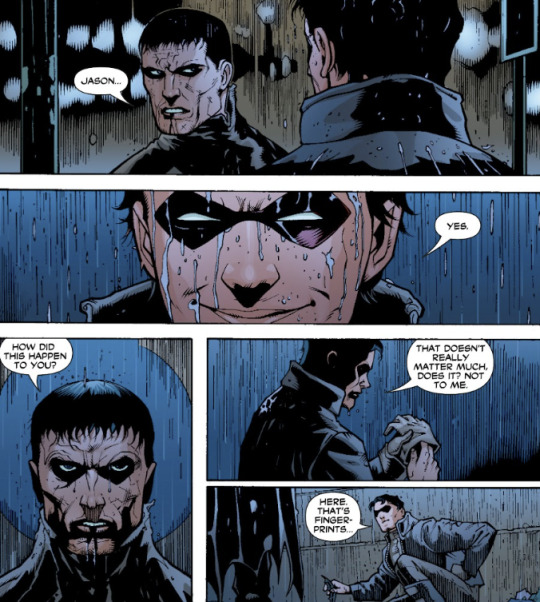
Even when Jason takes his mask off, Bruce still takes on the "I need to investigate this" angle even though Jason calls him out that deep down he already knows it's the truth. This of course foreshadows Bruce's underlying flaw, he doesn't want to face Jason head on because he feels too much grief about what happened to Jason and his guilt is more important than Jason's own grief. Just as the father has lost the son, the son has lost the father.
What follows is several chapters of Batman fighting crime as usual and making no attempts to directly search for Jason. They cross paths a few times but when they do Bruce doesn't follow. In fact, Bruce only shows up when Jason sends Bruce a sample of the joker's hair and Bruce knows that the Joker has kidnapped him out of Arkham. Bruce almost lets Jason get killed by Black Mask because he doesn't know whether to stop Jason or save him yet again, and then they have their final showdown where Jason has kidnapped the joker to demand Bruce kill him, and Bruce finally attempts to talk him down.
Out of context it sounds like I'm describing the same plotline, to the point where if you haven't read either, it looks like I'm complaining baselessly. Why is one hero doing nothing until it's too late good, and the other bad? The difference is of course context, or rather framing. Bruce's actions are called out by the people around him (Dick, Jason, Alfred) as him handling the situation wrong. Whereas both Enji's internal monologue and other characters say that he is doing his best to atone for his actions and deserves a chance, but the events we are shown in story are the exact opposite.
Here's another example to SHOW my point. Here's Dabi with my special, hardcover edition of under the Red Hood.
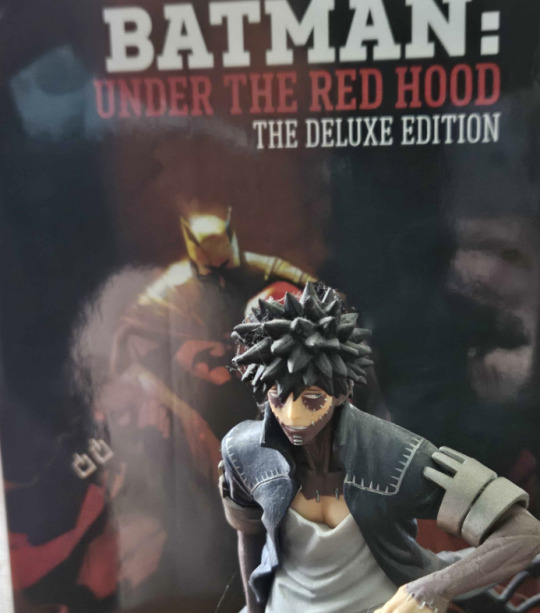
I reread the entirety of the fourteen chapter plotline and the majority of internal narrations come from characters outside of Bruce observing his behavior and commenting on how differently he's acting. Jason's backstory for instance is told by Alfred, not Bruce. Dick Grayson the first Robin comments on Batman's odd behavior. The rest are the third person narrator. Bruce has four instances of internal monologues spanning a few pages each in a 378 page story. (Alfred has the most internal monologues and he's presented as a more trustworthy unbiased narrator than Bruce, to get us to question Bruce's actions).
"Information travels on many routes, sometimes it comes predictably like the tides. You just need to know where to stand and meet it. Other times it's elusive and you have to root through the garbage to find it. In the last few years I've come to rely on Barbara Gordon, Oracle, we all did. Utilizing every form of surveillance equipment she has been the eyes and ear [...] but those days are over. I can't rely on anyone anymore. [...] and tonight it's also about the company I keep. It's different with him [night wing] out here. I think about when he was younger, when I was younger, it was different, simpler and I miss it. I miss those days, for that it's hard to be around him.
This first internal monologue is a case of unreliable narrator, because as soon as finishing it Dick Grayson / Nightwing shows up, offers Batman his help and while Bruce at first refuses it the two of them are forced to work together to fight Amazo. What does this show us? Bruce is not alone, but Bruce actively acts like he's alone ignoring the feelings of the other people around him. It exhibits a flaw of Bruce and the bad headspace he is in mentally (if I remember correctly Stephanie Brown recently died in the comics while this storyline was being published. It establishes Bruce's improper coping mechanism with grief, and how he is going about it the incorrect way.
Bruce says I work alone, and then Bruce says it's easier working with Dick, I miss it, but I can't go back to those days. It's bruce's contradictory thinking patterns in the same chapter that stop him. it's bruce's fault he cannot connect to Dick, and he is actively mourning the past because his relationship with Dick has changed.
Now the final part of the monologue in that chapter.
He's quick. Not just fast, agile. He's not thinking about his next move, he's just making it. He's been trained well. And there's something about him. Something familiar. There was something interesting about before he cut the line, before it had been taught. That had to have been practiced. Either that or just plain dumb luck. No it's not luck.
This is the first hint that Bruce already suspects it's Jason from early on but is in denial about it. This unreliable narrator trope also gives an agency to Bruce's decision, he is actively choosing to ignore the possibility that it's Jason because it doesn't want it to be.
Whereas, a lot of Endeavor's plot takes away any agency from him. For example, he doesn't even know that Dabi is Toya, because if he had the sneaking suspicion and ignored it like Batman did that might have made him look bad. We can't have the main character in a tragedy looking bad now can we?
The second monologue is more denial.
That device is from Kord industries. I should know. Ordered it special from them. How can he have it? No more dead ends. No more questions. No more guessing. Tonight I find out what is passing for the truth.
Reading between the lines this is outright confirmation Batman already knows.
The third is a brief reflection in his feelings for Jason.
The armor has to be light enough to fit but strong enough to protect. But sometimes a great many times, it's not strong enough. It wans't strong enough for Barbara who has to fight from her chair. It wasn't strong enough for Stephanie, other dear soldier enough dear grave. And it wasn't enough for Jason. Willful Jason. Who ignored the danger. Who spat at risk. Who was never frightened enough. I've always wondered... always... was he scared at the end? Was he praying I'd come save him? And in those last moments when he knew that I wouldn't. Did he hate me for it?
This monologue directly shows without stating it outright, Bruce is prioritizing his feelings of grief and failure mixing them in with his genuine grief over the loss of a son. it's selfish of him, but grief is a selfish emotion.
Here's the thing Bruce is allowed to be selfish and to not have the correct reaction to his grief, because the whole story is centered on Bruce being unable to get his shit together in time, and this picture into his emotions is an explanation as to why. Bruce is afraid of being hated by Jason. Jason of course has every right to hate him for failing as a father, but still I think not wanting to be hated to a person you loved so much and feel genuinely sorry over what you let happen to them is an understandable reaction.
Meanwhile we have Enji saying repeatedly all the right things in his monologue, the selfless, I don't need to be forgiven, it's okay if they hate me, I just need to atone but he never actually does anything. There's no explanation for why he isn't doing anything either, so that narrative dissonance. We're shown why Bruce doesn't act in time, he's internally a mess to be frank. We are not shown why Enji doesn't act in time because his internal monologue tells us again and again he's committed to atoning and he understands what the right thing to do is.
As Codenamesanzanka says:
Enji is still saying all the right things, but the story isn't giving him the opportunity to actually do the right things. To have his new actions matter. I have no doubt about his sincerity in his mantra, but without the 'show', it's hollow. Similarly, "Let's talk" is actually kinda bullshit too, because it's so vague. This is less about Enji, and more about the writing, how it set up this scene. "Let's talk" or "I want to talk" or any of that variation is repeated 6 times, without anything more or specific added.
There's an excess of repetition of Enji saying he wants to atone, he's ready to atone, without any of that materializing in the story.
As @class1akids says in this reaction post:
It also feels also super-hollow to say he's sheltering the family from the fallout, after they've just talked about how Fuyumi lost her job (and got a new one through the connections she herself built). How is he going to do that?
The fourth because I don't want to write it down, it's just Batman monologueing on how his partnership with Jason is still good and explaining the technical details of his fight with count Vertigo. It's in chapter 10 if you must look it up.
So four monologues total. Two monologues establish indirectly that Batman knows that Red Hood is Jason and doesn't want to face him. The third monologue establishes why he doesn't want to face him, he's afraid of being hated. The monologue is in line with Bruce's actions in the story, Bruce investigates several ways of reviving from the dead instead of looking for Jason.
The character's reactions around Bruce are also talking about how he's not acting like himself. Especially Alfred's who speaks of Bruce's indecision, on whether to put a stop to or save Jason.
"It is curious. He is lost in thought. It is not like him to spend vast stretches of time immobile, where his mind is gripped in the solitary process of deduction. This is quite different. He is hesitating. At a loss for what to do. I believe it is about Jason. And whether or not to stop him or save him."
This is illustrated in two scenes later where Jason spends a long time simply watching when Jason is fighting enemies, first in a fight against Captain Nazi, and second Black Mask. Jason even gives a direct callout of that behavior.
Jason: What the hell took you so long? Couldn't decide if you wanted to let me live. Batman: Shut up and fight.
Observed by Alfred Bruce is completely stalling and can't choose, observed by Jason Bruce can't decide whether to let Jason live or not. Bruce hesitates twice. We know why. We see it in action. It's called out as flawed behavior.
Now let's cover all the tell that don't show that is Endeavor's many monologues.
Pro Hero Arc:
I have to safeguard the future for them. That's the job for whoever's on top. What about the lives I cut short? Just demanding forgiveness isn't enough, it's too late for that. At this point I need to atone there's no other route.
Hellish Todoroki Family 1:
I'm trying to make ammends going forward. It might be too late. but I fall asleep every night thinking about it. Lately it's been the same dream. The wife and the kids looking happy at the dinner table. But I'm never there with them. It might be too late but I fall asleep every night thinking about what I can do for my family. I wish you could be here too, Toya. It's always the same dream. My whole family's there but not me. If I really care how they feel [I'll remain here].
I'm not going to read 200 chapters so I'm just going to ballpark it based on memory. Here we go.
Dabi's Dance:
My eldest, Toya didn't harbor frost within him. He didn't have a way to overcome the inescapable downside of overheating but I nevertheless sought to raise the boy as a hero. [...] Because Toya had more potential than me I placed my ambitions on his shoulders. I thought it could be you. You could have been the one to reach my eternal goal. My frustration... My envy... The ugliness in my heart... you could have been the one to smash it all to dust.
Plot twist this is the only monologue I like. It's different from all the others, and it's the only one where Enji is being emotionally honest. He put the emotional burden of his own emotional insecurities on an eight year old child, and expected to live vicariously through him and when Toya failed to live up to those expectations he just abandoned him. It alligns what we have been shown so far, Enji is not acting like a reptentant man here who realizes the harm he's done to Toya and only thinks of Toya as an extension of himself and his own regrets.
The Fight Against AFO:
My mistakes took the form as Toya leading to many stolen futures. The past never dies. Rage, resentment and even penace wound together toward the future. And the future is a path for the young. A path with so many branching choices. That's why I must win this. [I'll keep paying my penance. I'll win today and keep my eyes on Toya.]
When Enji decides to double Suicide with Toya:
I take full responsibility. I swore to bear the burden and live my life atoning for it all. However, you've been watching me all this time. While I couldn't be there to watch you. You were someone I especially needed to do right by. No I can't let you meet your end alone, but I won't let anyone else get caught up in our tragedy.
Hellish Todoroki Family Final:
I came to talk about what's to come. I'm retiring as a hero. That was my initial plan even before the war started, but now I can't even walk on my own. The hero endeavor burned to death. Your flames were really stronger than mine. [...] You're right. You know everything about me, Toya. After all you were always watching me. And you wanted me to do the same for you, but I didn't. Not matter what anyone says your heat does come from my hellflame. From now on I'll come everyday, so let's talk. It's too late now, so let's talk. [...] You're free to hate me. Anything is fine really, so throw it all at me.
This one is spoken dialogue but it's still a four-page long monologue. Every one of Enji's monologues with one exceptionsays the same thing: I'm sorry, I'll spend the rest of my life atoning for my actions.
We're repeatedly told Enji is atoning but he acts like Batman. Then, his actions should be framed as Batman, not atoning but avoiding any responsibility.
As observed by Class1akids when we were discussing the update:
Everyone else faces an uphill struggle with their lives, but we should all feel sorry for Enji atoning and being in hell. I hate Hori's compulsion to over-write his abusers and over-explain their atonement. He does this with Bakugou too but with Enji it's more irritating. It was so much more enjoyable when he just wrote the thing but didn't point at them and say -> look, they are atoning. Aren't they soooo cool??
Enji's internal monologues and the other characters frame him as some sort of martyr, while on the other hand it's clear by both Batman's actions and Alfred's observations he's not acting like his usual self. In fact, this is an interpretation of Under the Red Hood that I love from the writers of the video game Arkham Knight that does a less tragic retelling of Under the Red Hood:
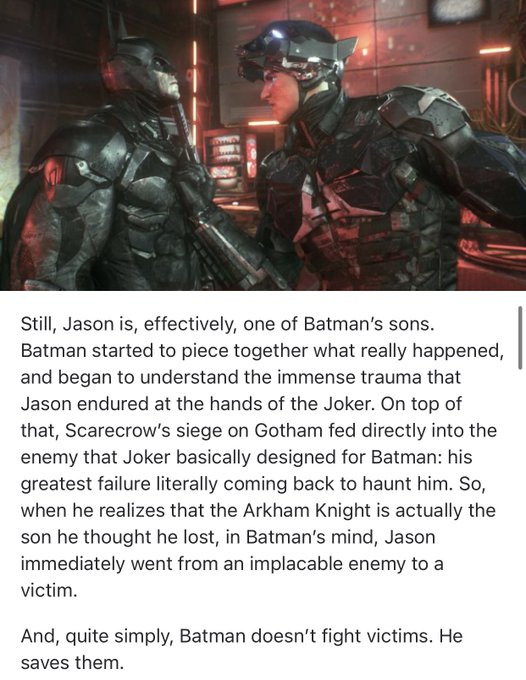
Batman doesn't fight victims. He saves them.
Therefore if Batman is fighting Jason, a victim, he's not acting like Batman. I'm also fine with Arkham Knight being an Under the Red Hood retelling because it's a different story. Comics do this all the time, different universe versions, popular storylines adapted into different mediums. It also works as a commentary on the original story, by showing what Batman could have done to lead to a more positive outcome it makes Batman's choices in Under the Red Hood worse and more tragic because he could have saved Jason, there was still a chance.
So here we have two flawed tragic heroes who are meant to be both pitied and condemned for their actions. One of them is all pity with no condemnation. The other is both pity and condemnation, Batman is grieving, but also he's failing his responsibility towards Jason. Therefore one protagonist works, the other fails utterly.
I'm not saying abusers don't deserve redemption. I'm not saying Enji should have died in order to atone. I'm not saying that the underlying problem with the arc is that they decided to make Enji sympathetic and a focus of the arc. The most important problem is the breaking of one of the fundamental rules of storytelling: Show, Don't Tell.
The Tragic Villain
Not only does The Hellish Todoroki Family plotline fail to make Enji a compelling protagonist, it also fails it's biggest victim. Now, these are both stories that end with the hero failing to save their victim. So if both of these stories have the same ending, why am I saying it failed Dabi, but not Jason?
Well, let me explain.
Dabi and Jason are both villains turned victims. The stories themselves are about this ambiguity. How much should the be held responsible for their own choices? If they are actively harming innocent people, then shouldn't they be stopped? Should they be automatically be forgiven just because of the pain and grief they've suffered, even if they've been causing it to others?
Both characters are also reflective of their fathers because they are too being selfish in their grief, they want their grief acknowledged and so are violently lashing out.
Jason and Dabi both make plays at being vigilantes at first, Dabi wants to inherit Stains will, and Jason Todd wants to be a better bat-man by taking control of the drug trade in Gotham and cutting crime down by executing gang heads. However, neither of them are being honest with this and it's shown through their actions, both of them abandon their original plans.
In the final showdown all Toya cares about is facing Enji on the battlefield, and when he's on the brink of death his mind erodes to the point where all he can do is scream for Enji's attention while his flames get hotter and hotter.
Let's take about Jason first and how his narrative treats him a whole lot better and more sympathetically, with more humanity than Batman. Jason is still held responsible for his choices, he is criticized by Bruce for murdering gang leaders and passing it off as justice. He's also blatantly shown to be a hypocrite. My favorite scene from Red Hood: Lost Days, the official UTRH prequel.
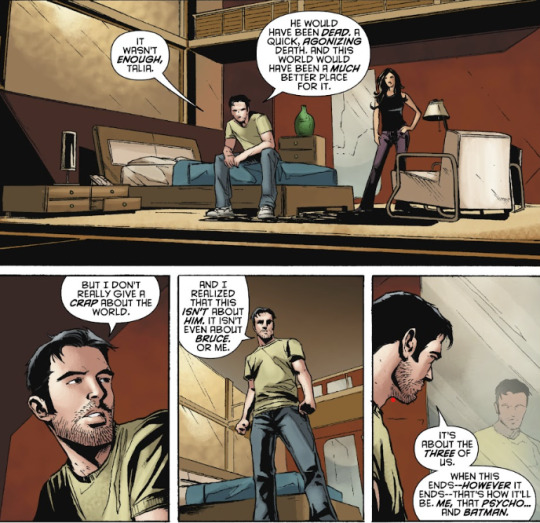
"I want to kill the joker in a cool way. Just sniping the Joker from a rooftop isn't dramatic enough for me."
This scene, and the final scene of UTRH underlines Jason isn't executing criminals because he believes it's the right thing to do, or because of his stated motivation that killing the joker would prevent more future victims.
Instead his every action is to set up a scenario where he makes a selfish demand of Bruce. He wants Bruce to prove to him that he would choose him over being a hero, by setting up his final scenario. Him, the Joker, and Batman. Jason will shoot the Joker. Bruce has a gun. He can either choose to let Jason kill the Joker, or kill Jason to stop him, either way it makes it clear what Bruce's priorities are.
The underlying reason for this is similiar to Bruce. Just like Bruce, Jason is deeply afraid that Batman doesn't love him. That he thinks of him as a failure. (This is Toya's main reason too).
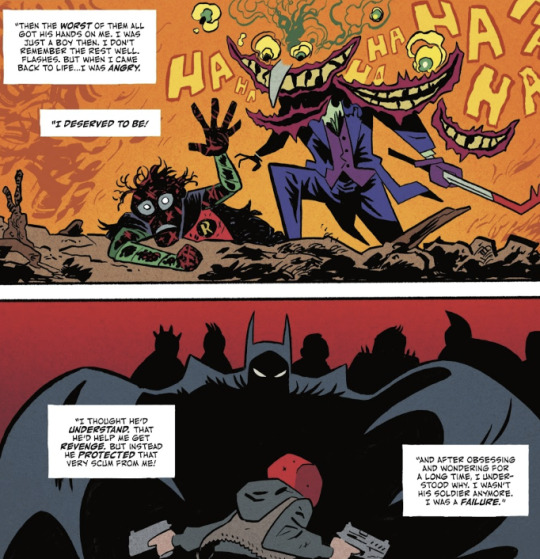
He also interprets Bruce's failure to avenge him to mean that Bruce didn't even care enough to mourn him. If Bruce loved him enough, he'd choose him over the joker, but he's so afraid that Bruce doesn't love him enough that he's going to force Bruce to choose.
Along the way he's also going to behead several crimelords in order to put an exclamation point on that point.
The way Jason completely unravels in the confrontation shows this insecurity, he begins with monologueing about how batman should totally kill people, until his fear that he wasn't important enough, and his grief at losing his father is revealed.
Batman: I know I failed you, but I tried to save you. I'm trying to save you now. Jason: Is that what what you think this is about? Your letting me die. I don't know what clouds your judgement worse, your guilt or your antiquated sense of morality. Bruce, I forgive you for not saving me. Jason: But why on god's green earth is he still alive? Ignoring what he's done in the past. Blindly, stupidly disregarding the whole graveyards he's filled with people. The friend's he's killed. I thought killing me - that I'd be the last person you ever let him hurt. Jason: If it had been you that he beat to a bloody mess. If it had been you he left in agony. If he had taken you from this world. I would have done nothing but search the planet for this pathetic pile of evil, this death worshipping garbage, and sent him off to hell.
Direct statement, it's irresponsible of Bruce to let Joker live after killing Jason and should have put him down to prevent future victims. Reading between the lines, Batman not taking revenge for Jason is a sign that he didn't love him enough, Jason loves Batman more because he would have taken revenge.
As the confrontation continues and Jason's mental spiral worsens, to the point where he can't keep up his pretense of self-righteousness.
Jason: I'm not talking about killing cobblepot, or scarecrow, or riddled, or dent. Jason: I'm talking about him. Just him. And doing it because...he took me away from you.
The father had lost the son, and now the son had lost the father.
Jason's revenge is just a cover, for his grief at losing Bruce. I think this also shows a really positive aspect of Jason's character to humanize him instead of condemning him for his actions to ignore or even justify the suffering he endured: Jason really loves Bruce.
I mean how meaningful is the statement: "Bruce, I forgive you for not saving me."
Bruce has been afraid to hear the whole time that Jason hates him, that he won't forgive him, but Jason loves him deeply. In fact his love is almost equal to his rage because Jason is a deeply emotional person, and these little details make him human and not just like a plot obstacle that Bruce has to face. A metaphor for his past failures.
Dabi is drawn as a crying boy who wants comfort, Jason is shown to be a crying boy who wants comfort through both dialogue and action without us directly needing to be told. It's a heartbreaking line and doing it because he took me away from you and it lands perfectly because the narrative wants us to just look at Jason's grief. It doesn't add an asterisk* even though he was in pain, he's done unforgivable things that can't be justified to undercut Jason's suffering.
In fact that might be another underlying problem with The Hellish Todoroki Family, the narrative tries too hard to make you feel a certain way instead of just presenting things as they are to make you come to your own conclusion. UTRH doesn't support Jason's revenge based serial killing of villains. It doesn't say he's justified to cut off the heads of mobsters. However, it doesn't excessively state "Well, I'm really sorry what happened to you but what you've done can't be forgiven" so we don't have to challenge ourselves to feel too much empathy for Jason's suffering.
Meanwhile even when Toya tries to express his rightful anger and grief, we're always met with someone shutting him down and saying well yeah, but you're wrong, involving innocent people is unforgivable.
As said by @stillness-in-green in the replies to this post:
I think so much harm (in-universe, but the state of the Twitter fandom makes me think the messages are pretty toxic irl, too) comes out of portraying the Heroes as needing to weigh in on the *morality* of the Villains' actions before they gauge "saving" them, when that is not a thing that glorified cops have any business thinking they have the right to do. Demanding repentance before the rehab is so bizarre.
You can say someone's actions are wrong without using it as a factor to consider whether or not their suffering as a human being should be acknowledged, and like I said there's multiple instances of people just yelling at Toya how immoral he is instead of addressing the elephant in the room.
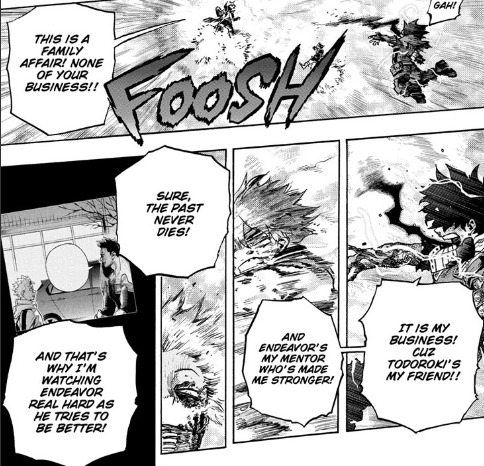
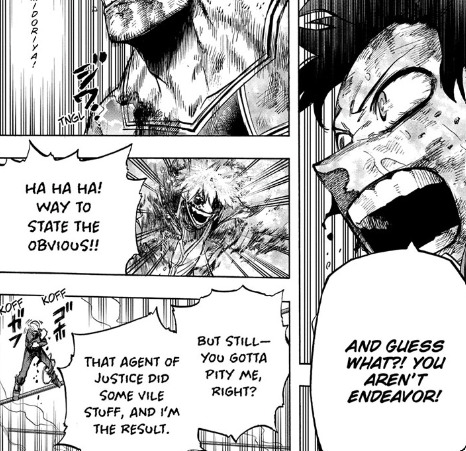
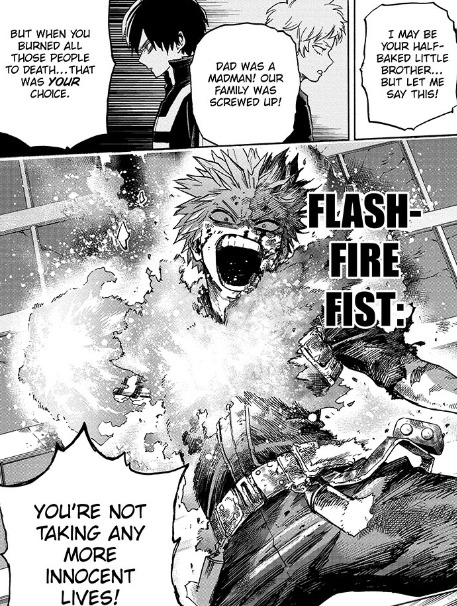
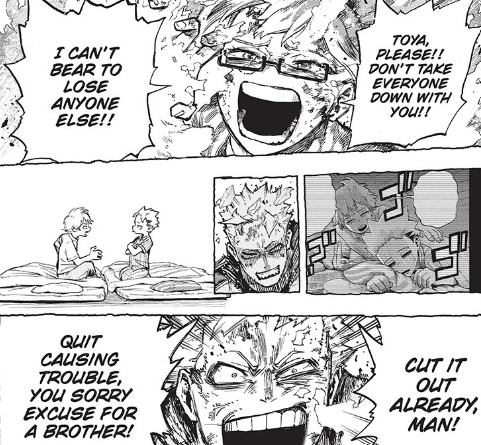
You're wrong, you're wrong, you're wrong, you're wrong.
(Okay, I understand that some people have interpreted this as a show of Honnae and Tatamae, the Todoroki's who are a very repressed household are finally talking about their feelings even if those feelings are selfish and ugly).
(I'm not criticizing Shoto for saying that the people he killed were his own choice necessarily, Shoto is a character who's actions need to be read more deeply than his words he was dedicated to bringing Dabi down without him burning himself any further start to finished. My criticism lies in the fact that Hori uses Shoto as a mouth piece because he thinks we need to be reminded that murder is bad).
However, even acknowledging that time and place man, time and place. They couldn't have done that in the aftermath, when Toya isn't burning to death?
Hey buddy, you're being selfish.
Toya: AHHHHHHHHHHHHHHH I'M MELTING, I'M MELTING.
This is I feel the underlying problem with the way the arc is written, not because the Todorokis are a very traditional Japanese family and there are cultural reasons they express their emotions differently, I'll give a caveat to that it's a nuance I might not understand.
However, I am arguing the actual problem is tell don't show. Horikoshi thinks that we as an audience need to be told multiple times that murder is bad, and we cannot be trusted to interpret that on our own.
Under the Red Hood shows both sides of Batman and Jason's debate, and let's us just come to the conclusion that Jason is in the wrong because revenge isn't justice. Horikoshi reaches no shit sherlock levels of telling us that we're not supposed to approve of Dabi's murders.
it's also a matter of giving Dabi narrative space to express his feelings, like every time Dabi tries to talk he is continually shut down (Shoto does engage Dabi talk to him and listen to why he didn't come back though I'll give him that) and it seems to be to push forward this weird idea that you shouldn't sympathize with the pain Dabi has endured or the ways he's dehumanized unless he does something to prove he deserves to be treated like a human being first.
Jason gets to monologue and make an entire argument, and his argument also shows the depths of his love for Bruce and what a deeply feeling person he is, and how those feelings being hurt and twisted could logically lead to his lashing out.
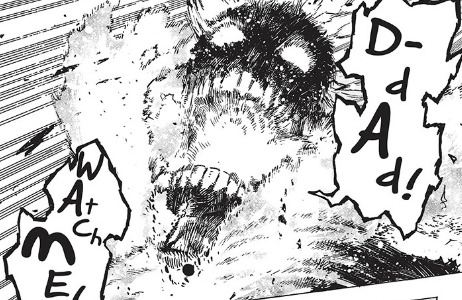
Compare this to Dabi who doesn't get a final monologue, but is instead reduced to a completely mindless state where he just cries out for his dad's attention. He doesn't get to make his argument.
Jason and Dabi both choose to blow themselves up, but Jason gets enough character agency to show this is a deliberate choice he's making even if it's the wrong one. He retains his character agency and ability to make decisions until the end of the narrative.

Jason's also you know physically crying. The end result of the narrative is about wrong choices that both Bruce and Jason make together, and then suffer the consequences together. Bruce watches the same failure play out again and he isn't able to save Jason, Jason doesn't get what he wants, he doesn't get revenge and he doesn't get to reunite with his father. It's tragic for both of them, and brought about by decisions both of them made.
Whereas yes Dabi makes a lot of bad decisions leading up to the last war arc, but in the end his final fate is up to a choice Enji made to not face Toya in the final battle.
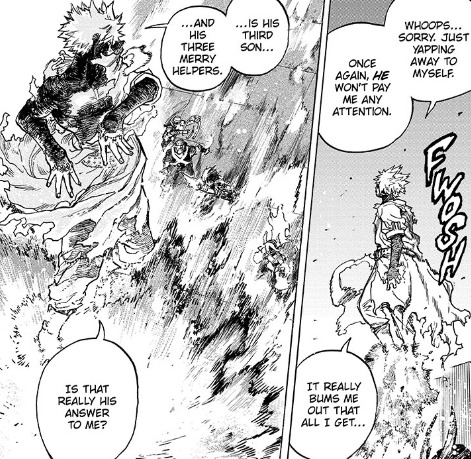
However, while the final consequence of the battle is brought about more by Enji's decisions than Toya's, it's Toya who endures all the suffering and punishment. It's Toya who is in an iron coffin, and doomed to slowly and agonizingly die with all of his skin burnt off unable to move. Toya doesn't even get agency after the arc is over. Enji still has a wheelchair, Enji can still move around, Enji's still fucking rich, he's not in prison for his actions, he as Rei wheeling him around.
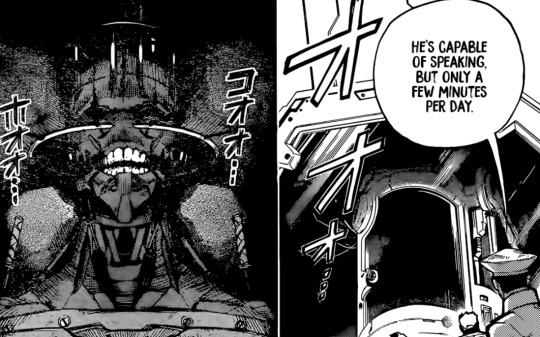
Toya's agency and choices are all taken from him, presumably to serve the plot purpose of making Enji save him to finish off his arc, and then ENJI DOESN'T EVEN SAVE HIM.
Also I think it's important to mention, Bruce's tragic ending is brought about by him attempting to save both, trying to save the joker and Jason with the same action. Whereas Enji's tragic ending is brought about by Enji NOT LIFTING A FUCKING FINGER TO HELP. Yet, it's Dabi who has the lion's share of suffering, and is sentenced to this horrific state of being skinless in an iron coffin and only being able to be awake a few minutes a day with no choice but to waste away.
Bruce is also immediately called out for his actions, by the Joker of all people, you handled this all wrong, it's your fault. Bruce is right to not kill the joker, killing the Joker would not have solved any of Jason's problems, but the fact that he put off facing Jason for so long, and his inability to communicate that he loves Jason is what leads to Jason thinking that the only way to prove Bruce loves him is to force him to choose. It's because Bruce has utterly failed to show him in any other way that he is loved.
Joker: Oh my god, I love it! You manage to find a way to win, and everyone still loses. I'm going to be the one who gets what he wants tonight, badda bing, badda boom."
I'd also like to add that a lot of agency in Enji's actions are taken away too, to make him look more blameless. It's not Enji's fault that he didn't say anything to Dabi during Dabi's dance, he passed out because he had a punctured lung. It's not Enji's fault that he spent a month protecting Deku instead of searching for Toya, he had to protect innocent people. It's not Enji's fault that he didn't go immediately to face Toya in the final war arc Hawks told him not to.
It's not Enji's fault that he made Shoto and Toya fight like Pokemon instead of cleaning up his own mess, and also he feels really sorry for it and as soon as he's done punching the bad guy he'll look after Toya he promises.
Enji does get called out for this behavior but it falls flat because it only comes from the villain AFO, and Toya himself. As I stated above too, the ending is more influenced by Enji's actions not Toya's (because Toya's agency is stripped away until he's mindless) but Toya is the one who has to die while Enji gets to live and atone.
That is the real sticking point for The Hellish Todoroki Family, the way it ends.
Themes Are For Eight Graders
The underlying problem with the whole arc and why The Hellish Todoroki Family fails as a tragedy, is because it wasn't written to be a tragedy.
The above quote is from an interview with the writers of the widely hated Game of Thrones Season 8, which took a sudden tragic turn for Dany's character, gave her an incredibly dehumanizing ending of being put down like a rabid dog by her own lover, an ending that was neither foreshadowed nor did it match with anything written before.
In this meta here by @hamliet it goes far more into depth that Game of Thrones isn't a tragedy, but a piece of Romantic fiction (not a love story, Romanticism is a genre of big emotions, the beauty of life, larger than life ideas hence why it fits well with fantasy genre, it can be sad but it doesn't follow tragic structure).
Dany is a romantic heroine, a deconstruction of the idea of the classic warrior princess trope, and you know a colonizer, but she's not meant to be written as an inherently bad person. There are people who say that Dany was going to die in the original books. I'm one of those people. Me. However, context and framing matters, Dany for all her colonizing ways does genuinely want to do the right thing, so it's likely she'd die a heroic death as a reflection of her selfless intentions (and intentions do matter for fictional characters) whereas in the show she's put down as a villain.
Now watch me I'm going to coin a term for future literary critics to use: Narrative Gaslighting.
Narrative gaslighting is different then Show Don't Tell, where an author has just failed to properly show what they're trying to tell you in the story. Narrative Gaslighting is when a narrative deliberately tries to mislead you, straight up lies to you, or just insists things that did not happen totally happened guys. Much like real gaslighting, Narrative Gaslighting makes you feel stupid for interpreting things a certain way and insists you were wrong all along.
Narrative gaslighting is when Tyrian gives a speech that everyone should have suspected Dany when she burned slavers alive that she was secretly evil and would one day turn on them.
Like, no.
Dany is flawed because she is a foreigner, interfering with the politics of a different country that she does not understand in order to gain enough resources and men to return to her home country and invade that country to exercise her right as a Targeryn to uphold the divine right of kings.
Game of Thrones doesn't mention any of that shit that's in alignment with the previous actions in the story, it's just insisting the very ableist notion that Dany was insane all along and her violence towards other people is the result of her mental illness.
(Also before anyone says, so if she's a colonizer than how can she have good intentions, everyone is Bad in Game of Thrones, they're all waging war to vie for a throne, monarchy is bad guys. IDK how to tell you that Game of Thrones has gray on gray on gray on gray morality).
(Also this aside ties into the hangup of MHA and most popular fandom culture on Twitter, that Dany's moral failings somehow disqualify her from her humanity. In spite of the fact that on top of all of that she's a rape victim, and like, Dany's only on that continent in the first place because she was sold as a bride.)
But here's the same weird subtext that Horikoshi's writing of Dabi. The fact that Dabi was continually victimized and denied human dignity does not need to be addressed, because he did the bad things and didn't atone properly enough for it first.
In essence this random post on the gunnerkrigg court forums I found on the same day the chapter came out, displaying apollo's gift of prophecy.
"When someone is persecuted, it's important to inform everyone about their flaws. That way you don't have to feel anything about all the times that they were denied human dignity."
So, Dany is not written as a tragic hero but a romantic one, we as an audience are both meant to acknowledge her flaws and sympathize with her, not demonize her in an ableist way for being insane, and even if Dany is meant to die the tragic way she dies does not match up with all of the narrative foreshadowing that was built before that.
Like, for instance a lot of POC after the show ended kept telling everyone that Dany's actions in a foreign country were seriously problematic, and not only did the audience not listen but the showwiters didn't acknowledge it with the same subtlety as the books. So those people especially were able to pick up Dany's character flaws, and when the show finally acknowledged them it's not even in the way that critiques of the show were pointing out Dany's flaws it was just "she was insane all along." Not like taking time to go "no matter what the intention, interfering with the politics of a foreign country is wrong."
The problem with the Todoroki arc is essentially the same, down to the ableism (because outsiders continually call Dabi either a maniac or insane Demon without even giving credence to his grievances about hero society he's just reduced to an insane fringe element of society, and Dabi himself is reduced to a completely mindless, childish, insane screaming state where he can't make active decisions).
The Todoroki Arc is not set up to us as a tragic one. The ending is pretty clearly telegraphed to the whole audience. People are not wrong for thinking that Toya's ending would be either rehabilitation like Rei with the eventual hope of being welcomed home, or some kind of house arrest where he still gets to be with his family.
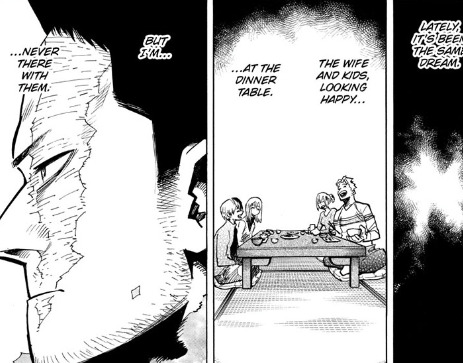
Everyone happy at the Dinner table and Enji not sitting with them.
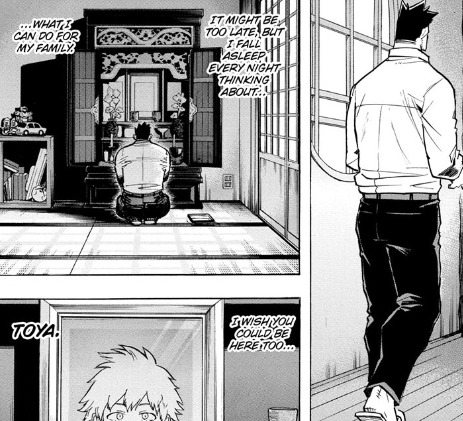
"I wish you could be here, Toya."
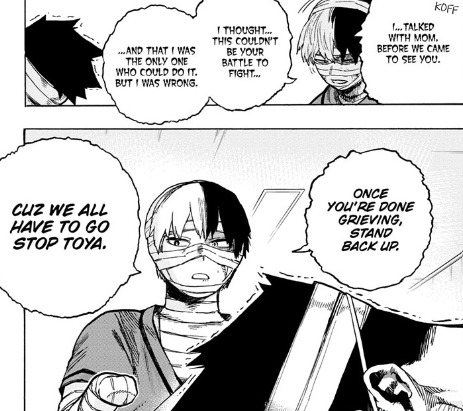
"We all have to go stop, Toya."
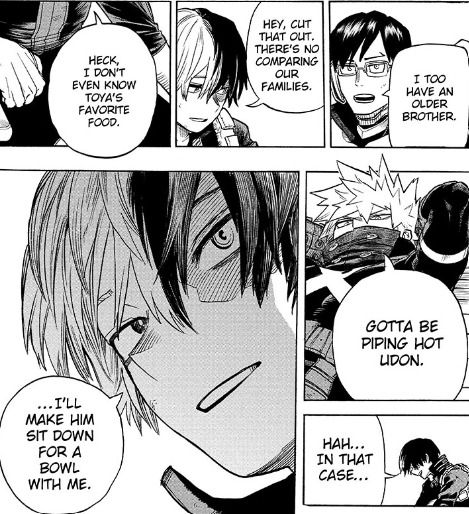
"In that case, I'll make him sit down for a bowl with me."
Even Shoto's efforts to take down Toya non-lethally are rendered completely pointless, because Toya gets back up again and then burns himself alive (completely by his own choice so no one has to feel bad that they failed).
The story sets up the expectation that Toya is going to be brought home and sit down for a meal with his family. Then it makes you feel stupid for going in an entirely different direction. It was always going to end this way didn't you know The Todorokis are a tragedy?
Well, I just spent a very long section of this thesis statement illustrating that if it's supposed to be a tragedy, then it's still not written well.
It's a written as a romantic story of a family healing, and the villain getting saved, only for the villain not to be saved and the story to just keep on going like not getting saved isn't a huge failure. This is something that should permanently destroy the main characters, that they got the chance to repeat Sekoto peak and be there this time and they all utterly failed. I feel bad for Shoto most of all because he did everything right, and he still loses his brother, but does the story show that?
The problem is the story is blatantly lying to you about the fact that Toya was somehow saved, even though he LITERALLY LOOKS LIKE HELLRAISER. To quote Codenamesanzanka again:
But I feel the story couldn't give us that because it will remind the reader and everyone just how much Touya will be missing. In-story, talking any more will overburden Touya's heart - and how apt is that metaphor? So let's talk about how we'll talk, but that's all that's allowed here for this scene. Else we'll see how unfair it is that Touya has to be confined to this room, he isn't with his family and they have to come to this prison just to tell him about their day, and soon he will be gone. Details make it real, and it would've exposed the lie that Touya was saved in an actual way. The story knows it too - "this extra time Shouto gave us." This is all 'extra', and not the core. [...] If the story was sincere that this is a case of "it's simply too late" - as it should be!!! imo, to really drive in the clear point that they failed, they did not get the save they wanted, because that's the truth - the tone of the chapter isn't tragic enough for that. The tone is going for 'Making Peace With This'. We've skipped the stages of grief and all we have is acceptance. The characters have accepted this, and so must the readers as well.
Therefore it's narrative gaslighting, the story is making us doubt our perceptions and trying instead to manipulate us to feel a certain way. We don't have to question the unfairness of Toya's fate, because look at all the people he's hurt, and look how Enji is atoning and taking responsibility.
The story builds up the idea that Enji will choose Toya. That he will choose being a father over being a hero. Enji doesn't do that, and it's Toya who suffers the horrific, painful consequences while Enji gets off mostly scott free. Mind you it's also ableist to suggest that being in a wheelchair is some sort of life-ending consequence like he's fine. The story even goes out of its way to say how avoidable this ending could have been if Enji or Rei or someone lifted a single finger to give Toya the acknowledgement he wanted, and then gives it a "Too little, Too Late" conclusion but doesn't acknowledge that this is where it's ending and instead tells us that Enji has successfully atoned.
"Everyone's watching me. So this is what it's like. If it was such a simple thing, then why not sooner?"
If it was going to turn out this way Toya should have just died here, not because death would somehow be a mercy compared to life in prison, but because the Todoroki Family doesn't deserve to get to pat themselves on the back. If they let Sekoto Peak happen a second time, then they should have to deal with the consequences of that.
It would be consistent is my point. This is written as a "Too Little, Too Late" kind of ending, but we don't get the emotional response from the Todorokis that they've let Toya die a second time.
On the other hand, UTRH has the exact same tragic ending but it doesn't make me angry because it's honest about it. The Todorokis let Sekoto peak happen a second time. Batman let Death in the Family happen a second time, but look at how even the narration and comic panels of the story acknowledge it.
"Fate is a funny thing. It swells up like a raging current and we are forced to travel. It provides us no exit. No deviation. It drops us in a bottomless ocean and compels us. We either swim, or drown, and sometimes as we struggle against the tide, a great truth arises."
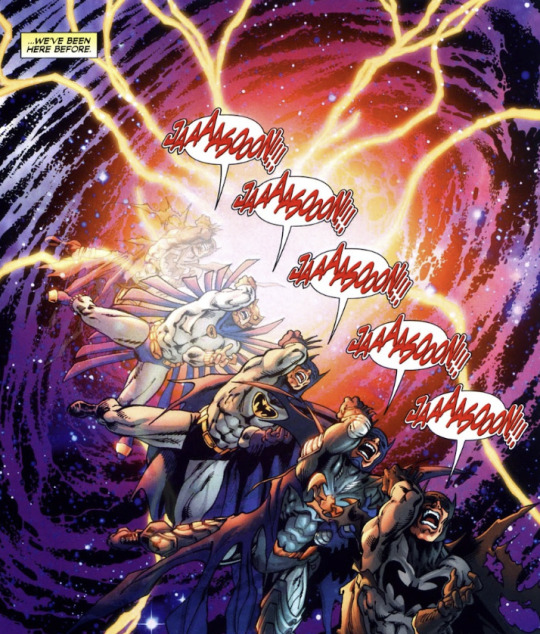
One ends with Enji meaninglessly stating that he'll spend the rest of his life atoning for Toya and watching over him (which I guess will be like two months tops) for the fifth time. The other ends with Batman being lectured by the Joker of all people of how he chose wrong and being forced to watch once again as a warehouse blows up, and he's completely helpless to save Jason.
UTRH ends with the message that Batman sucks, Enji's atonement arc ends with Natsuo calling him cool for atoning and UTRH makes me like Batman way more as a character. Whereas at this point I feel nothing from the Todoroki Family, except for a disgust for the way that Toya not only has to die, but has to die a slow, gruesome death while the rest of his family walks away with the small comfort of "oh at least we'll get to say what we need to say before Toya passes."
Especially with the fact that Toya's greatest fear was that when he died, he died meaninglessly because his family never grieved him and all moved on with their life. I guess we don't have to analyze how gross the underlying message that criminals don't deserve to be sympathized with because themes are for eighth graders.
EPILOGUE
The post is finished but apparently everyone expects me to cover every single possible angle even in posts this long.
You didn't address the cultural aspect. Under the Red Hood is a western story, and Todoroki Family is based on eastern concepts.
The post isn't about that. The post is long enough I can't cover every single topic. Here's someone who covered that topic thoroughly. This one discusses more about the nuances of collectivism.
Also, since the Todoroki Family obviously copied Under the Red Hood's homework, it warrants a comparison. Especially since it seems to critically misunderstand what made the original work.
Which is a valid form of Literary Criticism, as Ursula K Le Guinn once said:
It doesn’t occur to the novice that a genre is a genre because it has a field and focus of its own; its appropriate and particular tools, rules, and techniques for handling the material; its traditions; and its experienced, appreciative readers—that it is, in fact, a literature. Ignoring all this, our novice is just about to reinvent the wheel, the space ship, the space alien, and the mad scientist, with cries of innocent wonder. The cries will not be echoed by the readers. Readers familiar with that genre have met the space ship, the alien, and the mad scientist before. They know more about them than the writer does.
The Todorkis aren't all to blame for Toya. Natsu, Fuyumi and Shoto are innocent:
You're right. It's just easier to refer them as the Todorokis then specifying "Enji and Rei" each time.
You didn't mention Shoto once in this post:
I have no cricism for Shoto's role in all this. In fact I think he's the best written part. I praise it here.
Shoto is a good boy, and he deserved to spend more time with his brother. The fact he won't be able to sit down and have dinner of him, is the greatest tragedy of them all.
#mha meta#mha spoilers#mha 426#mha 426 spoilers#shoto todoroki#dabi#toya todoroki#enji todoroki#under the red hood#jason todd#bruce wayne#batman#mha critical#todoroki family
598 notes
·
View notes
Text
TW: ABUSE, CHILD ABUSE
“He wants to air this dirty laundry to the world does he…? Dabi, you fiend…you’ve been waiting for this moment…when they couldn’t prevent mass destruction…and faith in heroes is wavering.” - chapter 292
I truly, wholeheartedly, believe that MHA as a story upholds the myth of the perfect victim. I do not want to discuss if Horikoshi did that on purpose, or subconsciously because of inner bias – I find no meaning in doing so. For me the execution of an idea, in the grand scheme of the narrative, holds more value than the intention of the author. I’ve also had my fair share of people infantilizing Asian authors in the anime community for their poor writing decisions for one lifetime. It’s patronizing to both the author and the people reading it. Whether or not Horikoshi intended for his themes of abuse to paint the picture they did does not matter, because that’s how it reads as.
MHA puts victims of abuse in narrow boxes and softly dictates what’s an acceptable reaction to said abuse. Victims are continuously walking a tightrope between being deserving of compassion and sympathy and being unredeemable monsters who are too far gone and are only good for martyrdom after being put down.
Eri fits the clean cut depiction of abuse victims that media usually gears towards. She is untouched by the cruelty around her - she preserves her innocence and kindness. She isn't assertive, but rather meek and passive. She doesn't fight back with force. And when offered help, she is receptive to it. That is not to say that Eri's depiction doesn't have a place in fiction, or that her portrayal can't be representative of the experiences of some - as we all deal with trauma and the inhumanity people throw at us differently. We see the same thing in the portrayal of Fuyumi, who shares many of the qualities discussed above. The same thing applies to her - i personally love the idea of all the siblings having different reaction to their childhood trauma and abuse. It shows that victims are not some type of monolith.
But the narrative treats the "forgiving" or "receptive to help/support" victims of abuse with more grace and with much more kindness. if you are willing to forgive, or the very least be quietly tolerant, the story grants you a happy ending. Forgiveness isn't a bad thing, it is an individual choice - but an abuse victim shouldn't have to do it for them to have a happy ending.
In a vacuum Eri and Fuyumi's character arcs and depictions of abuse are good but it becomes a problem when that's the only experience and type of victim we ever hold in high value or recognize as valid and deserving of compassion. Which the story reinforces.
Touya and Tenko's backstories aren't pretty nor comfortable or easy to sit through. Their responses to abuse aren't either. Reactive abuse is very much real.
#tw abuse mention#tw trauma#tw child abuse#this is unfinished#i just don't have enough time to expand upon it cause of uni#maybe some day i will reread mha and revisit this#posting it cause it has been sitting in my drafts for a while#other thoughts are very much welcomed :)#mha critical#bnha critical#my hero academia#mha analysis#anti mha#league of villains#anti endeavor#anti enji todoroki#media analysis#anti best jeanist#i hate him#he stinks up the place#i cant tag all the characters in mha that ignore abuse in mha#unfortunately#calling abuse dirty laundry is very bad very stinky#touya todoroki#tomura shigaraki#mha dabi#discussion#personal essay#essay writing
345 notes
·
View notes
Text

Can't believe Toga became the exact martyr that Curious was going to turn her into.


#like at least they are changing things#thats not a bad thing#but toga should have been part of that reformation#mha 430#bnha 430#mha spoilers#bnha spoilers#mha critical#bnha critical
474 notes
·
View notes
Text
How appropriate.


#bnha critical#mha critical#anti bakugo katsuki#anti bakugou#anti katsuki bakugou#anti bkdk#anti bakudeku
393 notes
·
View notes
Text
Hmmmm very interesting. So you’re saying that despite Bakugou’s immense strength and talent, he still ended up lower on the hero rankings as the 15th best because of his abrasive personality being difficult to work with. Almost as if being likeable is an important part of being a hero and can’t be neglected even if you’re powerful. Damn…if only that little tidbit of characterization wasn’t dismissed with a throwaway joke and was actually used as a stepping stone to character development.

#It’s funny but at the same time I can’t help but AAAAAAAUUUUUUGHHHHH#It’s not that that particular issue is never touched upon considering that Best Jeanist literally has a bit about making Bakugou less scary#during the internship. However the fact that his terrible attitude was seemingly never corrected after the fact (and persisted in his#professional career to the point where he is way lower on the rankings than anyone thought he would be is…)#I love the jokes and all but man…COME ON NOW#ENOUGH WITH THE SLAPSTICK YELLING AND CARNAGE#mha critical#my hero academia#mha 431#bnha 431#boku no hero academia#bakugou critical#bakugou katsuki#anime
202 notes
·
View notes
Text
So When Did Things Start Going Down Hill
I don't mean everything is shit after this, but things looking back started getting (steadily) worse starting with. Check bottom for more indept view on each option
A) at first I wasn't going to include this one as it happened before most of what I considered shit started happening, but with how much it blatantly favours this lazy-ass child abuser, how could I not include it. And of course, it shows so much evidence that he hasn't changed at all, like only even offering to teach Midoriya and Bakugo to manipulate his favourite victim Shoto
B) when it first happened I was devastated but expected this to lead to greater change to the hero system and society. But no, just a meaningless footnote to the heroes epic battle
C) literally no one questions how a top hero was just so eager to kill someone, or buy a wife, breed her, abuse & neglect his kids to the point one of them was believed dead. Only citizens whining about how Dabi is bad for them
D) here's this apparently big shot hero from the States we've never heard of before and immediately dies. If they wanted to keep Shigaraki from having too many powers they could of just chalked it up to the heroes interupting the process
E) the Todoroki family all blames themselves, this isn't to go into the complexity of abusive households, but to absolve Endeavor's responsibility and guilt. Despite the fact that as the one who created and was in control of this situation, he should be held accountable for theirs as well. The only backlash for his shit is framed as ohh poor Endeavor, he didn't mean for the child he threw away to create consequences, and now people are being mean to them
F) what was the point of this arc? Deku barely asks a villain three questions before giving up. He learns the HPSC had Lady Nagant acting as a secret assassin against any undesireables for them, covered up her arrest and got a replacement assassin (Hawks who has at least one confirmed extra jurdical murder under his belt). Witnesses an innocent woman get attacked for her appearance and was turned away from multiple shelters for said appearance. Deku: Hero Society is the Best, Nothing needs to change, because not every single apple in this basket is rotten to the core! Looking back he just looks worse for this
G) so this child, who due to his parents mistake was blackmailed under great threat & risk, into giving information to the blackmailer, deserves to be chained up and forced to take further risk by the heroes. Remember Endeavor never faces any consequences, nor does Hawks, but this child, Yuga, gets treated like this.
H) once again what was the point? How does Edgeshot know he can do this? How does he know how to do this? Why is he a top hero who has never interacted with Bakugo before this, sacrifices his appearing to be unharmed self, for a random hero student in the middle of a war? Oh and Edgeshot is revealed to be alive at the end of the manga, because Heroes have no consequences and live in magical fairytail land. Again what was the fucking point!
I) This was originally going to be two points, Oh poor Endeavor, victim blaming part 2 and the hospital battle. But I ran out of options and Endeavor doesn't need another personal option. So we got the whole Todofam blaming Dabi/Touya this time, and Endeavor being a whiney responsibility dodging coward again. Then we see the heroes knew that the villains were going to go after Kurogiri, kept him in a hospital. We see that the people aren't going after doctors or patients just trying to get to Kurogiri, get demonized for it. We have victim blamer/ pick-me Tentacole say that their kids will be attacked for this (already happening), and that it's up to them/ him to inspire the violent quirkests to not constantly attack, assualt, and otherwise discriminate against them, no need for the quirkists to be given any responsibility or consequences for their own actions. Oh and Spinner has major brain damage because how else was Tentacole supposed to win this arguement. Bonus points for Hawks calling for Toga to be murdered, doubling right back down on his previous murder
J) in this already overcrowded 3rd act lets make sure all these background characters get a scene! And despite the fact it took years for Deku to get a powersuit in the epilogue, All Might just randomly gets one, no build up or anything. AFO's backstory is left in the past so no one has to consider anything
K) I had hope going into this, but at every turn they kept on making it worse. Deku only tries punching and attacking, rather than make any attempts to actually talk unlike what Shigaraki has been doing since his introduction. Is randomly able to enter Shigaraki's head, doesn't have to see just how fucked Hero Society is as it gets cut short by moral scapegoat AFO coming in and revealing he orcastrated everything! Oh and he flat out kills Shigaraki. Living up to his name and not his goal. Deku that could my ass
Sorry if this comes off as super negative but I've been wondering this for a while, and well I'm pissed at the ending. Here's some people I want to hear the opinions of:
@moodyvoid @nagitosstolenhand @codenamesazanka @shortstrawberryshake @darkonekrisrewrite @nothingofinterest @itsnothingofinterest @villainsandvictimsalliance
Feel free to @ more people
#bnha#mha#bnha critical#bnha meta#my hero academia#mha meta#boku no hero academia#mha critical#anti endeavor#anti deku#anti katsuki bakugou#anti bakugou katsuki#anti bakugou#anti hawks#anti enji todoroki#bnha manga spoilers#mha spoilers#bnha spoilers
273 notes
·
View notes
Text
Midoriya's Delusion
This is post that builds upon my previous one, I've copied many of the points I made there to here. Albiet with some corrections and tweaks.
To summarize, I have a bit of a crack theory that chapter 430 isn't as real as we've been led to believe. (As for when this actually takes place, that's up to you but I like to imagine the start of his third year marks the beginning of his mental decline.)
(As an update, I find it dubious whether 8 years have actually passed or if that's also a part of the fantasy. I can see Midoriya becoming so attached to the lie that his reference of time begins to warp)
This theory mostly comes from some inconsistencies in regards to the hero rankings and some other things I've found.
Corrections:
It's left ambiguous whether Best Jeanist and Endeavor are still active. However the fact that people view these two in a postive light (especially after Dabi and the war) still seems absurd.
2. Midoriya wasn't outright abandoned, rather their busy schedules make it hard for their days off to coincide. This falls apart when you look at this panel
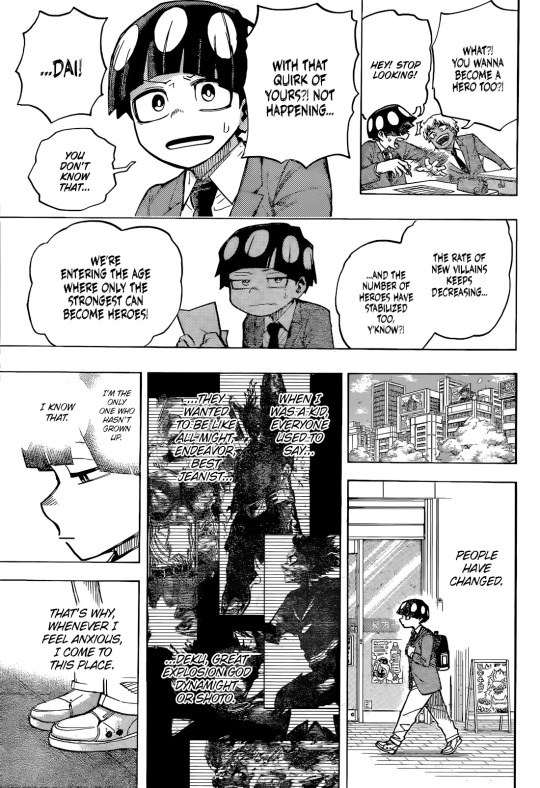
"The rate of new villains keep decreasing and the number of heroes have stabilized"
Besides Ochaco who's funding a quirk counseling project, the rest of the class should be able to make time. Again it's stated that they aren't actually fighting.
There's no real threat to face. Besides PR and Community Service there's bot a whole lot else (besides the occasional natural disaster)
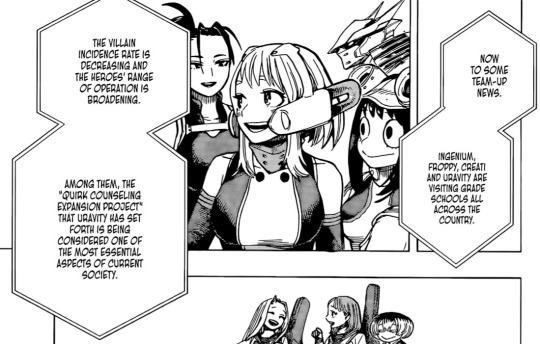
One could argue it's because the scope of what heroes do is increasing, thus keeping them busy. But again, we see heroes doing exactly what they did before, PR, Advertising and (implied) Showboating.
This leads me to believe that the lack of contact is based in reality, to some extent.
Whether it was by choice or forced by their (1A's) respective PR teams to preserve their images (can't be seen around the "freaks" for too long, now can we?).
The lie comes in the form of busy schedules.
Now whether that's what Midoriya tells himself or what he's been told, I cannot say for certain.
Disturbia:
For those of you who didn't read my last post, you may be wondering, so what's going on?.
Simply put:
Midoriya's having a breakdown fantasy to cope with the fact that he won't be becoming a hero due to the loss of his quirk.
Im aware it sounds crazy but consider the following:
1. Midoriya subconsciously knows the way he's been treated was wrong.
This manifests within the escapists fantasy in Bakugo's drop in the rankings + the attitude surrounding him (as well as his damaged hand never fully healing)
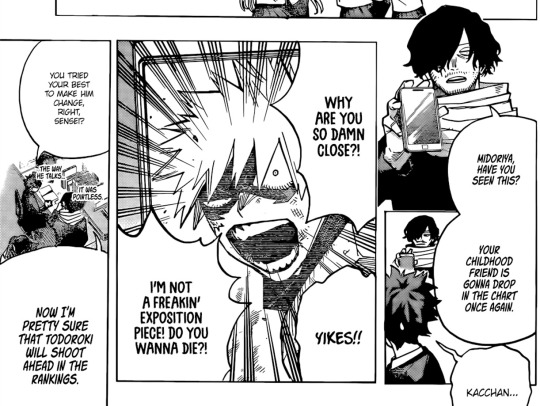
He meets a kid who just so happens to be in a near exact same position as he once* was (and still is to an extent). One could take this as his mind's way of trying to cope and heal itself, by having Midoriya do what he does best and help others, henceforth working though his trauma by using the kid as a stand in.
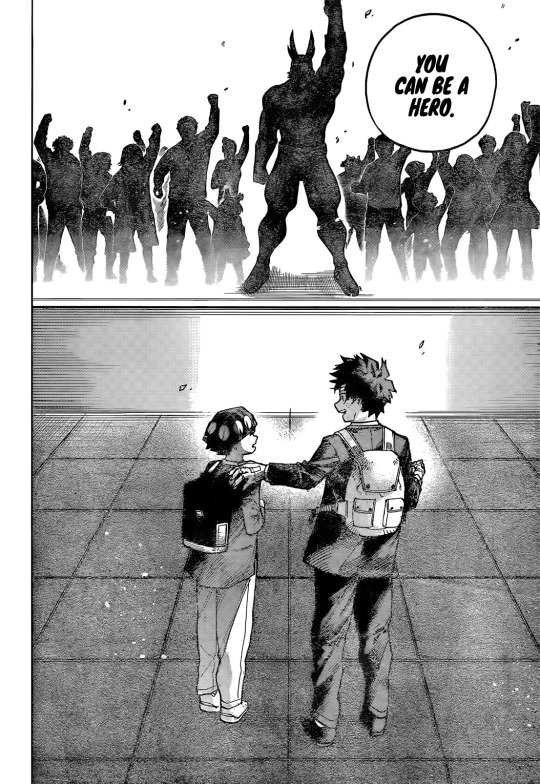
*Even the kid's "bully" seems to be a warped version of Bakugo (perhaps this is how Midoriya tries to fool himself into believing how it was)
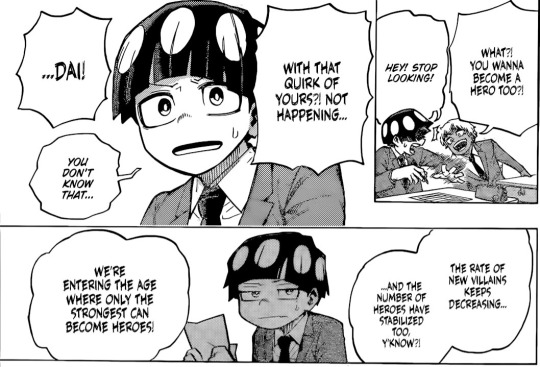
2. We see Kota.
I believe that here, Kota serves as what Midoriya thinks he could have been had he not failed. Kota is the idealized version of Midoriya here, the unobtainable.
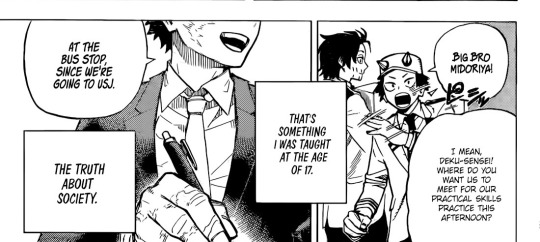
3. A lesson ignored
Apparently people forgot the connection between Endeavor and Shoto. You'd think this would be a good thing as Shoto would be able to become his own person.
This falls flat when you remember that also includes people forgetting the reason and happenings behind Shoto's existence, it feels like Midoriya is trying to have his cake and eat it too
To elaborate, this is a major copout, it allows Shouto to be unaffected by his family's past bith career wise and emotionally. While also feeding into Midoriya's rather toxic belief that forgiveness is required to be a good person.
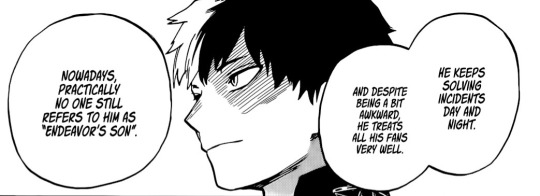
(The fact that killing Tomura violated this only adds to my theory that this whole thing is an escapist coping mechanism.)
(You can also add the idea that Tomura didn't forgive society for what they did to him and his friends. That likely broke all the "rules" that Midoriya knew.)
4. The Mech Suit is a massive cope, it's the dying whimper of Midoriya's childish hope that All Might will save the day.
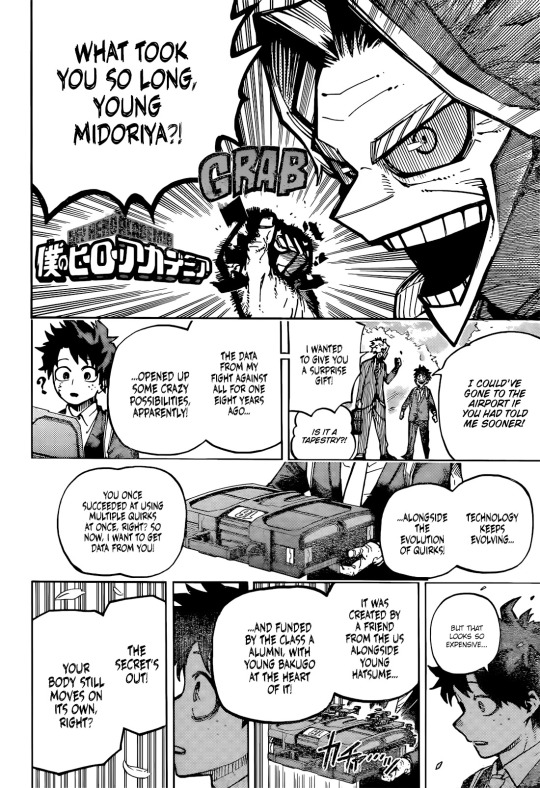
This time there's no magic quirk, no garrish mech suit, no plot twist.
No. There's only Midoriya and the consequences of his, his classmates and hero societies actions. It doesn't matter how shiny and seamless the illusion, how sweet the lie.
You can't hide the blood.
Concerning Aspects:
That was mostly the revised stuff, let me introduce you to some new points
1. A Frozen Lake
Something I noticed was certain characters seem to be almost frozen in time, as if someone tried to continue a story using scraps of the original text.
The curious case of Rei Himura:
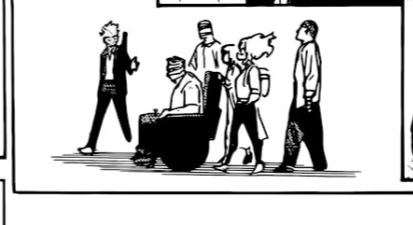
This scene seems almost stagnant, what was most noticeable was Enji's bandages still being on and Rei still being there.
It's as if Midoriya hasn't seen them in years (or perhaps doesn't want to acknowledge what happened). So his mind uses what he last saw/heard of them, creating a sterile, static scenario. Little better than props.
Those surrounding her (with the exception of Hawks) also seem to be stuck in the past.
It's definitely strange.
2. See No Evil, Hear no Evil, Speak No Evil
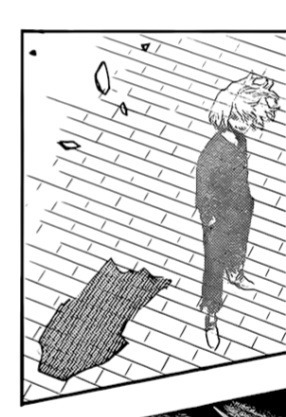
Shigaraki is a representation of Midoriya's repressed guilt and his fears. I believe deep down Midoriya knows that, inevitably the cycle will repeat, so long as the system is allowed fester and wallow in it's complancy.
I find the fact that he's behind Midoriya to be ironic, as if to say: don't look back, don't think about what you've done.
A Symbol of Stagnation:
I should warn you that it does get lengthy from here, however I think it's important to get the full picture. Even if I tend to ramble here.
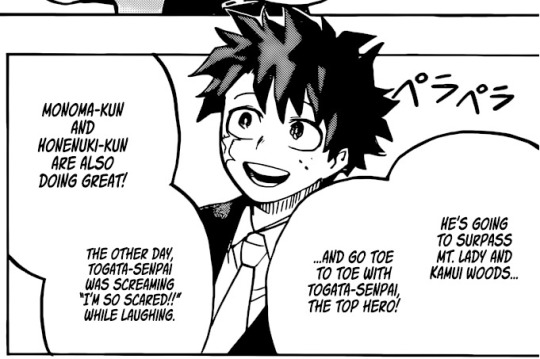
It's implied here that Lemillion's the top hero. This is awful for a variety of reasons. Mirio is a horrible symbol.
All Might was flawed for a variety of reasons, but a majority of these were byproducts rather than directly being his own doing.
Mirio on the other hand, has such a cancerous philosophy that it actively harms all who interact with it.
Mirio is a follower, he follows orders first and asks questions never.
Eri is the best example of this. Even after Nighteye's death, Mirio never truly reflects on the damage his actions could have caused ( only saved by the narrative, seriously it's a miracle Eri trusts anyone besides Midoriya after being abandoned like that)
You see, the difference between Toshinori and Mirio lies in their actions and principles.
Mirio left Eri to die, all for the sake of the "mission".
For all the heroes knew, Eri could have been a trafficking victim and either have been killed or relocated. But no, appearances and "gotta catch em all" take priority even after knowing Eri is in the Yakuza's clutches.
Lemillion made the worst decisions possible. He followed a known murder into a secluded, restricted area (with a hostage mind you) bringing his pupil with him.
Willingly ignored blatant signs of abuse (just look at the girl) and played hooky with thre leader of a criminal organization, who is known for his short fuse and willingness to kill.
He did all of that, when he could have easily detained Overhaul at any point (his quirk being a direct counter)
Toroshinori would fight tooth and nail in that situation. Consequences be damned if it meant saving Eri.
Part of the reason Toroshinori was so effective as a hero was 1. His sense of justice and 2. His compassion.
Mirio is a symbol that can be controlled, a weapon if you will.
The fact that Mirio is at the top shows that things haven't changed and are even beginning to decline. So this brings me to my next point
You may be asking, if Midoriya's losing it in his own mind, what's the outside world look really like?.
Allow me to set the stage.
4. Speculation
Within Midoriya's muddled mind, Lemillion represents both his toxic optimism and a subconscious understanding that nothing has changed. It represents denial and acceptance, a dysfunctional middle ground that's easy enough for Midoriya to stomach.
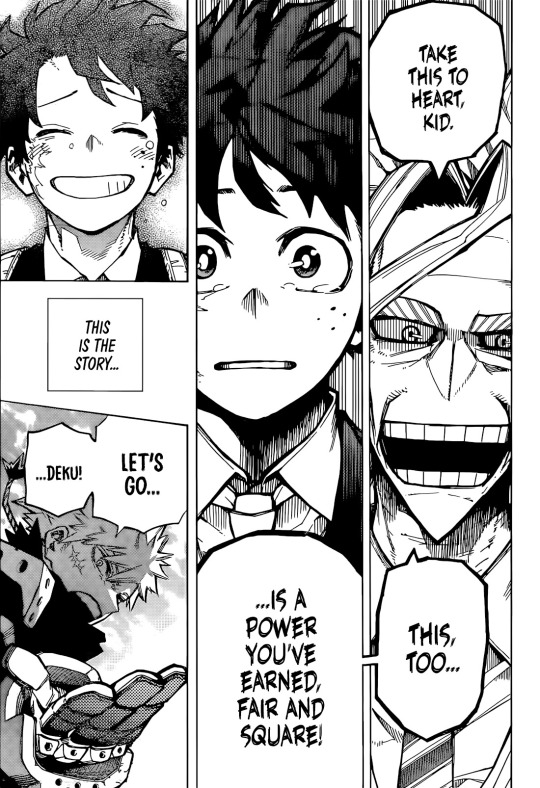
The truth of the matter is, delusion or not, the reality is soon to sink in.
Something that I don't see discussed is the lack of reactions from other nations or really any insight into how they were affected by everything that happend.
Here's the idea: Most likely they are foaming at the mouth.
Particularly it's the countries who suffered under Imperial Japan in the past (Korea, China, Singapore etc), however this also applies to every nation Nedzu brow beat into aiding with the rebuilding efforts, albiet their reaction would be latent.
Not not only is the attitude painfully reminiscent of how Japan handles it's past atrocities, Japan has had them clean up their messes. seen below:
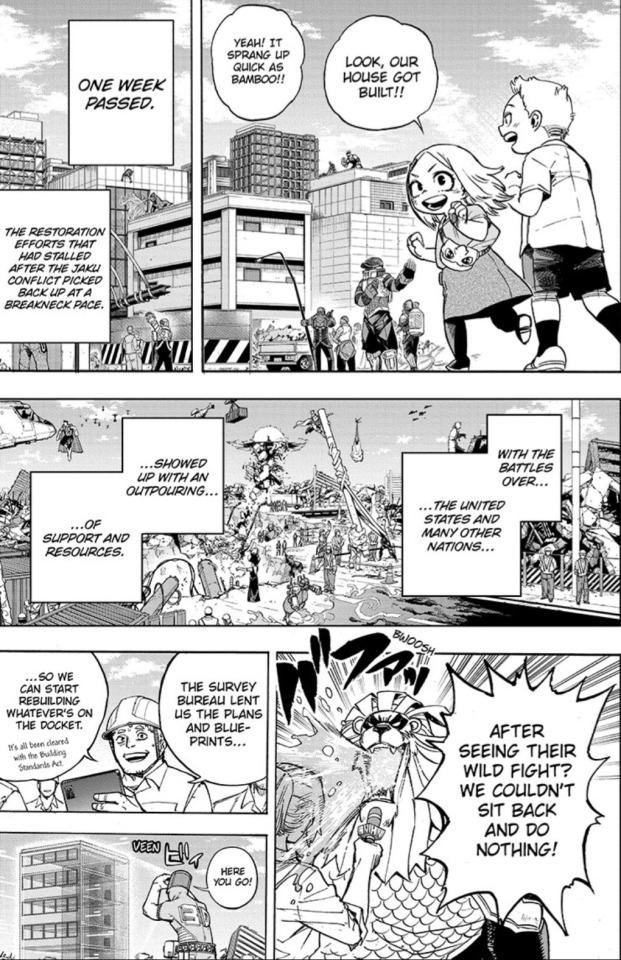
(you cannot tell me Big Red Dot over here is having a good time)
From an outside pov. The Commission never told anyone about AFO, rather they suppressed any information, locked him up in Tartarus and then sat on the whole situation until it blew up in their (read: everyones) faces.
He then proceeded to: kill over 8000 people (+ those killed during the Blackout period), kill the top hero of one of the world's most powerful nations and incite mass panic. Destroyed massive amounts of infrastructure and transport nationwide, broke thousands of criminals out of prison, destroying those prisons in the process.
Meanwhile the heroes:
Abandoned civilians in mass by quitting in the middle of a war.

Left the public in the dark for months and allowing crime and paranoia to grow rampant, even (forcibly) bringing someone they knew was being targeted by AFO and his forces to the one place they could find shelter.
Mutilated a seven year old girl. Who has a history of being mutilated for the gain of others and patted themselves on the back. (Also having no holdup on how that may effect her physically via her quirk or mentally via her trauma)
Mic: tried to kill a docile prisoner who could be considered in comatose, based off of his emotional attachment to a dead man + viewing it as justified if it meant Spinner couldn't get to him.
Used hospital staff and patients as meatshields (Central Hospital) during a riot.
Most had no qualms supporting a child beating eugenicist and implied marital rapist, even with his one of his victims exposed him and citing it as his main reason for turning to villainy.
Held an illegal questioning* with said abuser while ignoring his main victim (Rei, who is probably the most reliable source of information there)
(*which effectively is like conducting an investigation on yourself and declaring you are not guilty)
And so much more! (But this post is getting too long)
My point is by the time everything was said and done, it seemed everyone but Japan was paying for it.
It's outright stated that the US president risked national security by sending every hero they had to help Japan. (Impeachment worthy if you ask me)
Endeavor's little plan to kill himself and Dabi in a blaze of death ended up disrupting the weather. Very likely it'll end up resembling an El Niño phenomenon, only vastly off schedule and even more destructive than normal.
For Reference [https://oceanservice.noaa.gov/facts/ninonina.html]
Very likely it'll lead to an agricultural drought in the northern America's and mass flooding in southern America's, likely starting at the west coast and bleeding inland. Leading to a domino effect where cost of living surges due to the sudden displacement of people and the rapid loss of products.
Worse still, because the US had no heroes (likely for months on end), crime has likely surged in the America's, which will further impact the rest of the world.
The rebuilding efforts likely emptied the wallets of most participating countries, leaving them unable to help anyone, including themselves.
Also keep in mind that Japan incriminated themselves with the Business Course footage. I don't think the general public (outside of Japan) is going to take too kindly to a known murder and abuse apologist being in charge of a system already known for it's corruption.
The end result is likely be a world that detests Japan, either from a moral perspective (Rei's treatment + the treatment of those society abandoned), a financial perspective (we can't afford shit and you contributed to that) or historical perspective (you do this everytime and ignore the consequences).
A world divided by struggle and united by an immense loathing for the Commission's Japan and the culture surrounding it.
Oh, don't forget there's no finding left for quirk research. Meaning that it's very likely no one will be prepared for quirk singularity to start manifesting in the upcoming generations (Thanks Nedzu).
_______________________________________
Update: Can I just say that Aizawa's lack of ownership infuriates me even though this is likely a fantasy and not grounded in reality.
Like what the fuck do you mean "with the way he talks, it was pointless" Fantasy Aizawa.
Because "Hey Asshole", You deliberately ignored his attitude and offenses!. And what? Now your just gonna shrug it off like it wasn't your fault. To hell with that you had two years, most teacher are said to only get one. As you so graciously mentioned at the start of this shit show of an epilouge.
Heres the moment I'm referring to btw:

While we're at it. Are you telling me it was too hard to get Momo some proper attire all three fucking years she was at UA for.
Not to mention Toru is still naked, how the fuck hasn't she died yet, she is literally exposed to the elements (and lord help her of she gets a cut)
Kirishima's costume is still his biggest liability considering it exposes his chest and back (also seeing as even when hardened he can't repell bullets)
Does Denki still fry himself with his quirk?
Before we move on Aizawa. How's that daughter you neglected, her horn still broken?.
Speaking of which let's look at the rescue team:
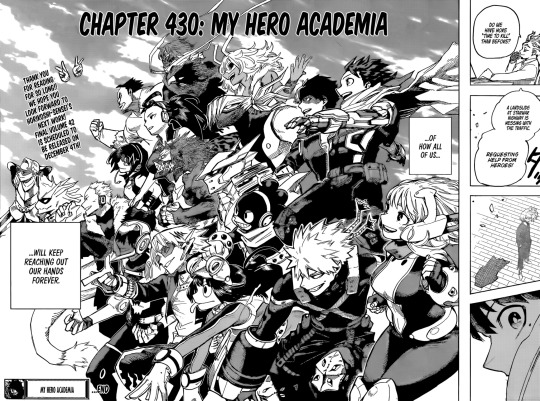
What the hell is this!?
Let's see, we got a guy who can only do damage (and his sweat detonates on contact, destroying whatever it touches.)
A brainwasher who only got into the hero course via nepotism and who can only brainwash people who directly respond to him!. A person trapped underneath rubble either frantic or groaning in pain isn't going to be able to respond or even just give consent.
(On a side note what are the laws regarding mind control quirks, does some sort of waiver have to be signed, can a person sue for being controlled against their consent?)
Oh, but wait there's more.
Midoriya running headlong with experimental tech that has, very likely never seen the light of day. Let alone preform in an actual high stakes situation before.
You're trying to carry someone and oops! Something malfunctioned or was miscalculated, now there's an even bigger mess (hooray!)
Who could forget Mezo "they'll come for your kids" Soji. Who climbed the ladder and pulled it all the way up.
Yeah forget that Heteromorph's were getting hate crimed long before the war, ignore the fact that you yourself were maimed by an angry mob after doing one of the most heroic things a person can do. Dismiss Spinner's comment about being sprayed with Pesticide for walking in public.
Nah screw it, let's all sing Kumbaya while the Creation Rejection Clan runs wild outside the reach of the cities, then ignore that the discrimination still is prevalent in the countryside and it's only a matter of time before somone gets fed up and takes matters into their own hands. (talons, claws, you get the picture)
But your a hero now Soji, you got your's. So fuck the rest of 'em
And don't even get me started on Hawks. Congratulations you ignorant bastard, way to kill time and by that I mean for everyone but the heroes.
"Yeah life is great!, everyone hates us, we're rapidly falling into debt from all that rebuilding 8 years back."
"Speaking of which some of those buildings are staring to fall apart due to being rushed to meet deadlines set within the month they were started."
"Social darwinism is on the rise and people are becoming more complacent that ever before due to heroes applying bandaid solutions on decade long, deeply ingrained problems."
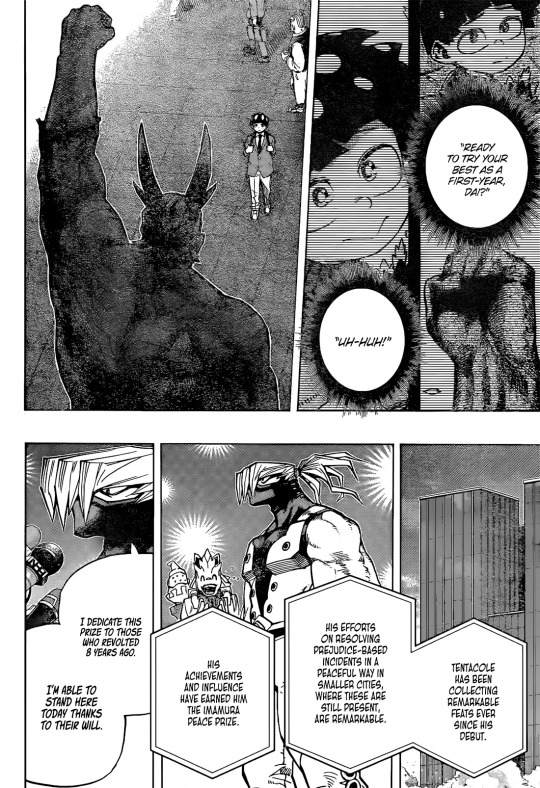
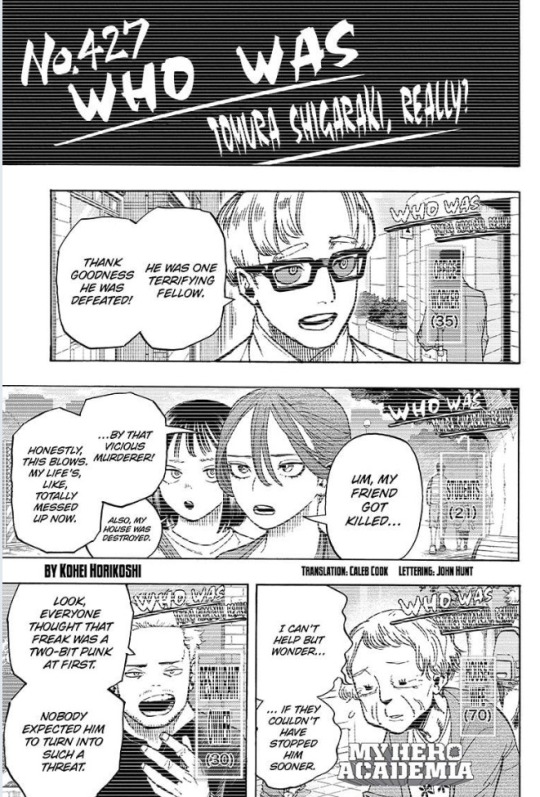
"All so the average person doesn't have to think about what's festering beneath society's floorboards, so thank you Safety Commission. Here's your star of positivity ⭐️." - Some random anti-hero civilian
So much for greatest heroes, huh.
_______________________________________
UPDATE 2:
A dark thought I just had, is that the main reason Izuku killed Tomura was because Tomura broke the rule of "Forgiving Your Abusers makes you Good".
When Tomura refused to relinquish his hatred, when he stood his ground, that is when Midoriya decided he had to die. If not to "stop" him, then to preserve Midoriya's perception of the world .
Shigaraki + The LOV by their very ideals went against everything Midoriya has had beat into him by Bakugo and Aldera over the years.
Makes me wonder how'd he react to a person refusing to forgive their abuser. If he interacted with Natsuo or Rei, I could see that delving into a complete mess.
Now that I think about it, The Midoriya we know now, he would have never tried to hold onto Eri back when they first met.
Ironically, he became what he named himself after, a Deku. A puppet attached to thorns of liquid gold, glistening and burning hot.
A slave to his own biases and belief system, now trapped in a stage of his minds own making.
First bound by his past, then by legacy and finally, now by his own hand.
木偶.
#bnha critical#mha critical#hero society critical#anti bakugou#midoriya critical#just a bit#hawks critical#anti shinsou hitoshi#anti eraserhead#anti enji todoroki#anti endeavor#anti aizawa shota#anti aizawa#anti mirio#lov#league of villains
286 notes
·
View notes
Text
Okay, but like, mha was a story that preached about hope over and over throughout the story. The setup was there from the beginning. We got up close and personal with the villains and got to empathize with them.
The main character literally states that the power of OFA is a power to save people, not to kill, so yeah, it was insane that Horikoshi concluded Izuku and Shigaraki's fight like that after years of build-up. Especially since Nana Shimura was deeply connected to their plotline, and she even said herself that saving somebody meant saving their life and their smile on their face.
Next up was Ochako and Himiko. My disappointment is immeasurable that Horikoshi went through with killing Himiko off as she's literally a child. She had so much life left, so much time to turn a new leaf around. Out of the 3, I always thought Toga was the least likely to die. I'm not going to search for the panel right now, but back when Ochako did her whole speech with megaphone and she talked about a bright future and smiling together and how Toga's safe flashed in her mind there..I mean I thought that was some hopeful foreshadowing that Toga could have a happy future one that included smiling. 😀 but nope.
Lastly, Touya and Shouto, actually, I won't get into it here.
I'll save that for another post, but I will say it's depressing that there were so many hints foreshadowing the todoroki family being whole again and it felt like the story was heading in a path of restoration.
But honestly, I don't think My Hero Academia works as a tragedy. If you're setting up a story to become a tragedy, you don't do it on accident. You set it up from the beginning with the tone and themes. That's why mha falls completely flat in becoming a tragedy for the villains in the last 5 chapters after years of the story having hopeful themes of second chances and redemption.
Mha doesn't work as a tragedy.
248 notes
·
View notes
Text
My Hero Academia spent its 10 year run concerned with the power of reaching out to others, but in the end, how powerful was it? Reaching out was not a miracle, it was not enough to save the people the climax concerned itself with. Even if it helped some characters along the way, at the peak of the narrative, it couldn’t do the job. What can reaching out do? Not a lot, says My Hero Academia, but maybe it can help in small ways. And isn’t that just anti-climatic. Of course the story feels unsatisfying; the thesis of the manga wasn’t even enough at the end.
Reaching out could have meant so much if Deku reflected on the power of extending your hand as Shimura Tenko stood beside him, alive and saved by that help. He could have continued a cycle of reaching out by continuing to be a hero to villains, coming to them with empathy and reaching out his own hand, finally able to save and heal instead of kill and destroy.
Instead, we learn that it might be enough, so long as it isn’t too late. It’s not just about the villains dying, it’s about the core of the story falling completely flat.
318 notes
·
View notes
Text
Weird how the class could barely ever see each other when Midoriya was just a teacher, but as soon as he gets this suit and can be a hero again, all twenty-one of them are all conveniently in the same place to answer a single call about a road being blocked by a landslide.
Just saying... eight years.
244 notes
·
View notes
Text
My Hero Academia/Boku no Hero Academia is funny cause like,
the show makes a Big Deal about being a hero despite your weaknesses and shortcomings, perceived or otherwise, and rising above it all. It stars a character with no special abilities and very real feelings and views and ideas and the way they take that first step... is by getting a Special Ability. The Specialest Ability of All even. And it ends with this character losing said Ability while not being able to save their Foil, a victim of the world Just Like Them, and only becoming a hero again, not from their Own Hand but by someone else buying them a suit. Once again, only becoming a hero thanks to another's actions
#and thats not even broaching the character of Bakugo#it was MID beginning to end for me#i knew something was wrong from the beginning but esp when they started changing Bakugo and I was right#and the Touya you do NOT get a happy ending part was rough#i dont know#bnha#mha#my hero academia#boku no hero academia#bnha spoilers#mha spoilers#anti bnha#anti mha#bnha critical#mha critical#mha criticism#bnha criticism#mine#my post
210 notes
·
View notes
Text


TOGACHAKO VS. FUFFY: How To Save Your Evil Girlfriend
So, once again My Hero Academia has failed to deliver on its promise of saving / redeeming one of the main villains of its story, and victims of its ficitonal society. This time I'm going to make the added argument that not only does failing to save Toga make the story worse, it also makes Uraraka's character almost completely hollow. While you can dismiss Deku's lack of character development as him being a shonen protagonist, both Uraraka and Shoto had arcs and Ochako's is effectively ruined by her failure to save Toga.
In order to make my point I am going to compare it to a villain redemption arc in another piece of media that does it right, Faith's character, and her strained relationship with Buffy in Buffy the Vampire Slayer. A series which is overall anti-state punishment and pro-redemption and delivers on practically all the themes MHA promised us.
MORE UNDER THE CUT:
THE GOOD GIRL and THE BAD GIRL
There is a reoccurring dynamic between two female characters in media, usually between a heroine and a female villainness that I like to call: The Good Girl vs. Bad Girl complex.
However, if you were a Freudian you'd be calling this a Madonna Whore Complex.
To explain the Madonna Whore Complex, one of the biggest examples in other Media is Aronofsky's Black Swan. The entire movie is themed around the Madonna Whore complex, and the impossible double standards the male perception imposes upon women.
"The white swan and the black swan are not merely characters, and not merely characters that are relevant to Nina. The black swan and the white swan are archetypes of women. They are emblematic of the Madonna and the Whore [...] . The white swan is the Madonna, she is pure, innocent, the ingenue. The black swan is the whore, she is cunning and deviant. The seductress. Nina and her ballet counterpart Odette are characterized as perfect ingénues. Ingénues are young, innocent girls who possess qualities of youth, innocence, kindness, naivete and purity. She is the fawn eyed damsel in distress and in literary films she's often the heroine or protagonist. On the other side of the coin from the ingenue, we have the seductress, embodied by Lily and her ballet counterpart Odelle. The seductress is characterized by her promiscuity, cunning nature and sex appeal. She is the alluring femme fatalle, willing to do whatever it takes to get what she wants. She's most often framed as the village. These draw parallels to Freud's psychoanalytical theory, a theory that suggests in the minds of some men they struggle to fully see women as fully realized and rather view them in archetypal categories." [SOURCE]
Black Swan is also a movie where Natalie Portman attempting to live up to the impossible expectations society has placed on her to be both the White Swan and the Black Swan goes insane, and quite possibly dies at the end of the movie.
Considering that Toga's entire story is that she is a shapeshifter who went mad because she could not fit both her parent's and society's expectations of being a "normal girl" then you can see why the Madonna Whore Complex is relevant, with the oversexualized, vampish, femme fatalle Toga quite obviously playing the part of the whore.
Before you call me a fraud for citing freud though, let me prove my point that the Madonna Whore Complex is quite literally everywhere in media.



I could literally keep going if this post didn't have an image limit: Jean Grey and Emma Frost, Jean Grey and Madelyne Pryor, Starfire and Blackfire, Raven and Terra, The Two Sisters from Ginger Snaps, t's literally everywhere all the way back to Lilith and Eve.

More intelligent takes on this trope play with the concept of the Madonna Whore Complex (MWC) to either present the archetypes as two fully rounded people (Catra and Adora) or demonstrate that it's impossible for women to fit into these two dinstinct categories (Natalie Portman in Black Swan).
Buffy the Vampire Slayer is a work that challenges the MWC, by allowing both its good girl, and bad girl to be fully realized characters. My Hero Academia plays the MWC straight to a sexist extent by not allowing Uraraka and Toga to escape their categorization of Good Girl and Bad Girl, and also going out of its way to punish and kill the seductress for her sexuality like this is a slasher horror movie. Actually, it's worse than a horror movie because at least Jennifer's Body plays with the MWC in a clever way.
It's not just bad writing anymore Hori's writing has crossed over into actively murdering female characters to enforce puritan values, but let's not get into that just yet we'll talk about the writing portion instead.
I'm going to outline what BTVS accomplishes, demonstrate how it does this below, and then go on at length picking apart how MHA fails.
BTVS:
Shows Buffy and Faith as fully realized people
Shows the pressure to conform to the "Good Girl / Bad Girl" label.
Breaks down those two categories
Redeems it's bad girl
With that out of the way let's get the ball rolling.
HOW TO (NOT) SAVE YOUR EVIL GIRLFRIEND
This is the part where everyone in the audience is going to gasp. Even though I'm using Buffy and Faith as a positive example of deconstructing the MWC and redeeming a villain, Buffy does not save Faith. The two of them reconcile in the end, but Faith is not redeemed or saved by Buffy, and in fact Buffy is in part responsible for Faith's fall.
So, why would I say Buffy and Faith are a better example of villain redemption then Uraraka who at least did everything she could to offer a helping hand to Toga?
Because Buffy not saving Faith is THE POINT and Faith receiving redemption even though Buffy gave up on her is also THE POINT. Lemme explain, by starting at the beginning.
BTVS is a story that exists to flip both horror tropes, and the idea of the chosen hero on its head. The concept started out with Joss Whedon noticing that the Cheerleader is always the first victim in any given horror movie, and wondering what it would look like if the Cheerleader could fight back. If the Cheerleader was the thing that monsters ran away from.
Which leads us to Buffy Summers. Buffy is chosen by the universe to slay vampires, she is hero with super strength that can easily take on legions of vampires and often has to fight even tougher villains for each season's conflict. Buffy carries all the classic features of both the ingenue and the chosen one protagonist rolled up into one:. Ingénues are young, innocent girls who possess qualities of youth, innocence, kindness, naivete and purity.
However, after dying in the first season, and having to kill her boyfriend in the second season after he turned evil and inflicted a lot of psychosexual abuse on her Buffy has also got a whole lot of trauma. Which is when Faith appears on the scene. One of the first ways that the show challenges the idea of the "Chosen One" is that there are actually two Chosen Ones, Faith being the other Slayer.
Buffy much like Deku has a case of protagonism brain rot, but in her case she was actually chosen by the mystic powers that be to be the protagonist of reality. Buffy, who views herself as the hero of the story as a coping mechanism (we'll get back to this later) is suddenly challenged when the fates chose yet another chosen hero, challenging her pre-conceived notion that she is the hero of the story. If Buffy is not the only hero then who is she? What is all the suffering she's endured so far if it's not a part of her own personal hero's journey?
Buffy begins to dislike Faith on sight for projection reasons, before Faith does anything wrong. In a way Buffy herself the female lead is enforcing society's standards of the MWC because all the reasons Buffy decides to disturst and dislike Faith on sight are because she exhibits qualities of the seductress.
Faith is openly promiscuous, often comparing the art of killing vampires to sex, she is also someone who is proud of her power as a a slayer and uses it for her own purposes. She is a slayer for selfish reasons (apparently) while Buffy is the selfless hero. In the first episode Faith appears in, Faith, Hope and Trick Buffy is almost immediately hostile to Faith who has so far done nothing wrong for, trying to get along with Buffy's friends, getting a little bit too into vampire slaying and openly relishing her strength, and like occasionally making lood comments.
FAITH: Don't… touch… me…! BUFFY - yanks Faith off the unconscious vamp with one hand, stakes the vamp withher other. Then she turns to Faith who is breathing hard, high on adrenaline, rubbing her fists. BUFFY: What is wrong with you? FAITH: What are you talking about? BUFFY: I'm talking about you living large on the great undead here. FAITH: Gee, if doing violence to vampires upsets you, I'm pretty sure you're in the wrong line a work… BUFFY: Or maybe you like it just a little too much. FAITH: I was getting the job done. BUFFY: The job is to slay demons. Not mash them into sloppy joes while their
Buffy then escalates to like ableist slurs towards Faith within half an episode for getting slightly violent in a fight against vampires that were trying to kill her.
GILES: Well, Buffy, you have to realize you and Faith have very different temperaments… BUFFY: I know, mine would be the sane one. Giles, she's not playing with a full deck. She has almost no deck. She has a three. GILES: You said yourself she killed one of them, she's a plucky fighter who got a little carried away. Which isnatural, she's focussed on Slaying,she doesn't have a whole other lifehere like you --
The twist this episode is that no matter how much Faith tries to present herself as a free-spirit, she's actually a scared homeless girl who just happened to become the Slayer. Unlike Buffy she does not have a watcher, a mother, or friends to support her. She lives in the cheapest motel in sunnydale. The reason she's so violent against vampires is because she is understandably having a trauma flashback because her mentor was murdered right in front of her by a different vamp.
This is repeating pattern throughout the whole season, Faith is shown to be a victim of trauma, and occasionally acts in ways that are understandable for a victim like her to ask, only for Buffy to start mischaracterizing her as someone violent and insane and throwing the slurs.
You can compare both Faith and Toga as characters who are complex victims of trauma who society turns their back on and become bad victims, but Faith is a special case because we actively see her turn to the dark side. Faith starts out trying to be a hero like the rest and she practically does nothing wrong for half a season, and when she does finally make a mistake and become a bad victim it's the hero's desire to punish her and castigate her that turns her into a villain.
We actively see Faith's fall happen onscreen, and it's like totally Buffy's fault. Buffy throws her completely under the bus, because she's so desperate to see Faith as the Bad Slayer and Buffy as the Good Slayer. Faith is almost pushed into evil because of the MWC, the characters around her can't see her as a fully fleshed out human being so they are quick to demonize her when she starts acting like a bad victim.
So the two episodes appropriately named: Bad Girls and Consequences depict Faith's fall. In that episode Faith and Buffy are fighting vampires, and one human is mixed among the vampires. The human grabs Faith by the shoulder, and Faith thinking that the human is a vampire turns him around and stakes him.
It's a complete accident, something that Giles even says later on is an accident that can happen to any Slayer on the job and is completely normal. It's a murder that Buffy herself could have committed.
GILES: This is not the first time something like this has happened. BUFFY: It's not? GILES: A slayer is on the front lines of a nightly war, Buffy. It's tragic - but accidents have happened. BUFFY: What do you do? GILES: The council investigates, meters out punishment if punishment is due… I've no plan to involve them,however. That's the last thing Faith needs right now. She's unstable, Buffy. She seems utterly unable to accept responsibility. Shows no remorse.
However, even in the same breath Giles explains that it's an accident and not Faith's fault, he's also calling Faith unstable and irresponsible. Basically when they're not calling her a psycho (just hitting her with the ableist slurs), the protagonists all lowkey imply that Faith is somehow inherently violent and unstable because she displays symptoms of a bad victim.
I might also remind you Faith has not done anything to earn any of these accusations, until she kills someone in a complete accident. A complete accident that Giles once again said wasn't her fault and wasn't really a big deal.
FAITH: My dead mother hits harder than that.
Faith is stated to be a victim of physical abuse, heavily implied to be a victim of sexual abuse, and is homeless (none of the main characters offer to let her stay in her house she spends half a season in a terrible motel). However, Faith is quickly demonized by the white wealthy main characters for acting in ways that are completely typical for a homeless teenager.
The moment she commits one mistake they all turn on her and use that mistake as proof of these violent tendencies they all want to accuse her of having. Faith can never be the ingenue so she must be the seductress, because she can't just be a person.
Buffy: So, I, uh... (sees Faith scrubbing) How are ya doin'? Faith: (still scrubbing) I'm alright. You know me. Buffy: Faith, we need to talk about what we're gonna do. Faith: (looks at Buffy) There's nothing to talk about. I was doing my job. Buffy: Being a Slayer is not the same as being a k*ller. Faith has nothing to say. She's finished scrubbing. Buffy: Faith, please don't shut me out here. Look, sooner or later, we're both gonna have to deal.
It is essentially two episodes of this, Faith after killing someone on accident in a life or death fight is constantly called a murderer by others. She wasn't even like, drunk, or high, or being especially reckless she was being a normal slayer.
FAITH: So the mayor of Sunnydale is a black hat. Shocker, huh? BUFFY: Actually - yeah. I didn't get the bad guy vibe off him. Faith shakes her head. Scoffs. FAITH: When you gonna learn, B? It doesn't matter what kind of "vibe" a person gives off. Nine times outta ten he face they're showing you? It isn't the real one. BUFFY: I guess you know a lot about that. FAITH: What's that supposed to mean? BUFFY: Look at you, Faith. Less than twenty four hours ago you killed a guy. And now you're laughing and scratching and zipidee doo dah. That's not your real face, and I know it. I know what you're feeling because I feel it too. FAITH: Do you? So, fill me in. I'd like to hear this. BUFFY: Dirty. Like something sick creeped inside you and you can't get it out. And you keep hoping what happened wasjust some nightmare…
Faith is dirty, faith is disgusting, faith is unstable, Faith is sick for... killing a guy on accident in a way that Giles said was a perfectly understandable accident, and not showing clear guilt because the moment she did it everyone around her jumped on her and started accusing her of being a murderer.
Why do the selfless main characters suddenly start demonizing this girl before she even did anything wrong - well it's because she's poor problem solved.
No, but it does play a factor. Why do most american white middle class look down on the homeless? Because, they must have done something to deserve it, right? If Faith killed a man, that clearly is an indication that she was violent all along and the heroes don't have to sympathize with the fact she's homeless or you know lift a finger to help her.
Now, this makes it sound like I hate Buffy, but Buffy is actually my favorite character in the whole show. The thing is Buffy's complete lack of sympathy for Faith makes her a better character. Buffy needs to demonize Faith and throw her under the bus, because Buffy is a victim of sexual abuse too. Her boyfriend turned evil after having sex with her once, and spent an entire season stalking her and terrorizing her the entire season 2 Buffy / Angel plotline is a thinly veiled groomer metaphor.
The thing about Buffy is she's not allowed to show any kind of reaction to her trauma. The episodes preceeding Faith, Hope and Trick are Anne, an episode where Buffy runs away from home after being sexually abused (stalking is sexual abuse) by Angel for a whole season and feeling like no one would understand her, and Dead Man's Party, an episode where every single one of Buffy's loved ones ruthlessly criticize her for having run away. Like, how dare a teenager not react perfectly to being horribly stalked by a serial killer after she had sex with him for like half a year.
JOYCE: Buffy! You didn't give me any time. You just dumped this… this thing on me and expected me to get it. Well -guess what? Mom's not perfect. I handled it badly. But that doesn'tgive you the right to punish me byrunning away. BUFFY: Punish you? I didn't do this to punish you XANDER: Well you did. You should have seen what it did to her. BUFFY: Great. Would anybody else care to weigh in? What about you? By the dip. XANDER: Maybe you don't want to hear it, Buffy. But taking off like that was selfishand stupid. Buffy's breaking down. It's all too much. BUFFY: Okay - I screwed up! I know it - alright!? But you have no idea. You have no idea what happened to me or what I was feeling
The reason Buffy is so hard on Faith is because everyone else is equally hard on her. The label of the ingenue is so difficult for Buffy to maintain, because she has to be pure, and without any flaws, especially when reacting to trauma that she throws Faith under the bus for her bad victim behaviors.
The white middle class demonize the homeless because they don't want to face the reality it can happen to them, Buffy doesn't want to reflect on all the things her and Faith have in common because she could very easily become Faith. Buffy is the victim of extremely similiar trauma to Faith, and being pressured to be the perfect victim of that trauma in a way that's destroying her mentally slowly.
FAITH: It was good, wasn't it? The sex? The danger? Bet a part of you even dug him when he went psycho BUFFY: No FAITH: See - you need me to tow the line because you're afraid you'll go over it, aren't you, B? You can't handle watching me living my own way and having a blast - because it tempts you. You know it could be you... ( Something snaps in Buffy. She rears back and POPS Faith a good one. Faith falls back, but she's smiling as she puts a hand to her bleeding mouth. ) FAITH: There's my girl…
Buffy is suffering under the expectations of the MWC too, but in her desperation to make Faith out to be the seductress instead of... like... a csa victim... Buffy is reinforcing those standards on both herself and another woman.
The entirety of Bad Girls and Conesequences is Faith being called a murderer by several people, having another trauma flashback to a sexual assault because Xander came to her motel room under the guise of "helping her", getting hit over the head and chained to a wall, then getting the swat team called on her and almost dragged to London for trial. Then the heroes do nothing to help her. The first thing Faith does is go to the main villain, who buys her an apartment AND A PLAYSTATION. So... the evil main Villain of the show helped Faith with her homelessness situation while none of the main characters lifted a finger.
it sounds like it sucks but it doesn't because it's all intentional. Buffy cannot process her own sexual trauma so she is just awful to people who are also domestic abuse victims. here's one of my favorite scenes, Buffy yells at a girl being beaten by her boyfriend with a visible black eye.
Buffy: Where can we find him? Debbie: I-I don't know. Buffy: You're lying. Debbie: What if I am? What are you gonna do about it? Willow: Wrong question. Buffy takes her by the arm again and pushes her up against the sink in front of the mirror. Buffy: Look at yourself. Why are you protecting him? Anybody who really loved you couldn't do this to you. She takes a few steps away. Debbie turns around to face them. Debbie: Would they take him someplace? Buffy: Probably. Debbie: (shakes her head, sobbing) I could never do that to him.(Willow sighs) I'm his everything. Buffy: (disgusted) Great. So what, you two live out your Grimm fairy tale? Two people are dead.
That poor girl gets her neck snapped like five minutes later and Buffy just kinda, moves on even though it would have been an easily preventable death.
Buffy getting mad at an abuse victim for showing textbook behaviors of abuse victims in bad relationships. Buffy is a good character because she is a hero, she can be empathic, but she really only understands heroism in term of defeating the bad guys, and when called to relate to people with complex trauma, especially trauma that reflects her own trauma she can't! She just can't process it! The expectations of being the ingenue, the perfect hero are so crushing she can't cope with a messy reality so she needs to have a black and white view of herself and other people.
Buffy needs to be firmly in the good category, and Faith needs to be firmly in the bad category in order for Buffy's brain to keep working.
Not only does Buffy's conflict with Faith characterize how much Faith suffers for being a bad victim, it shows how the pressure to be a good victim destroys Buffy mentally to the point where she starts using Faith as a punching bag.
Literallly.
It's all intentional too, Buffy gets called out on it, Faith always gets the last word and the final episode of the season makes out Buffy to be a hypocrite. After Buffy literally threw Faith under the bus, called her disgusting for murdering a man, Buffy is completely willing to murder Faith to get a cure for her vampire boyfriend who's been poisoned.
All human life is sacred and needs to be protected, but Fuck Faith I guess.
Faith: I could say the same about you. I mean, you're still the same better-than-thou Buffy. I mean, I knew it somehow. I kept having this dream, I'm not sure what it means, but in the dream the self-righteous blond chick stabs me, and you wanna know why? Buffy: You had it coming. Faith: That's one interpretation, but in my dream, she does it for a guy. Faith: I wake up to find the blond chick isn't even dating the guy she was so nuts about before. I mean, she's moved on to the first college beefstick she meets. Not only has she forgotten about the love of her life, but she's forgotten about the chick she nearly k*lled for him. So that's my dream. That and some stuff about cigars and a tunnel. But tell me, college girl, what does it mean? Buffy: To me? Mostly, that you still mouth off about things you don't understand. (Sirens) Uh-oh. I guess somebody knows you're here.
So the show goes to great length to show you that there are two sides to this conflict, Buffy demonizes Faith, because her friends expect her to be the perfect hero. Faith reacts badly to trauma because she has no support system, and the people around her have no empathy for her because they're too privileged to imagine the things in Faith's life ever happening to her.
Buffy and Faith are fully realized people.
Buffy and Faith are presented to the audience as the ingenue and the seductress but they're both fully realized characters. Buffy's not the ingenue because she's just as capable of murder as Faith is. Faith isn't the seductress because she's a homeless teenager. They are both victims of sexual trauma, though one reacts in what people consider an "acceptable way" and the other is a total slut about it.
Shows the pressure to conform to the "Good Girl / Bad Girl" label.
Buffy throws Faith under the bus specifically because the pressure in her life to be the perfect slayer is so immense that it could be her that takes the fall so she needs to believe in black and white concepts like she is inherently good and Faith is inherently bad to justify the bad things that happen to Faith and therefore convince herself said bad things could never happen to her. "You can't handle watching me living my own way and having a blast - because it tempts you. You know it could be you..."
Faith: Angel said there was no way you were gonna give me a chance. Buffy: I gave you every chance! I tried so hard to help you, and you spat on me. My life was just something for you to play with. Angel - Riley - anything that you could take from me - you took. I've lost battles before - but nobody else has -ever- made me a victim. Faith: And you can't stand that. You're all about control. You have no idea what it's like on the other side! Where nothing's in control, nothing makes sense! There is just pain and hate and nothing you do means anything. You can't even.. Buffy: Shut up!"
Buffy needs to fit her and Faith into neat little boxes because she cannot face the inherent senselessness of the world (and also that she is a victim too "you made me a victim")
Breaks down those two categories
Even in Seasons where Faith is not present she haunts the narrative, because the writers were well aware that Buffy and Faith are the same person under different circumstances.
All of Season 6 Buffy is faced with many of the same situations that Faith was, she suddenly becomes poor and in danger of losing her house, she has extreme depression from coming back from the dead (long story) she can't share those feelings with any of her friends because they treated her much like they did Faith - having no sympathy for imperfect victims. Buffy even gets into an unhealthy, sexual relationship, and like Natalie Portman basically changes from the ingenue into the seductress.
A relationship she has to keep a secret because once again, Buffy must fit into the box of the ingenue in order to be loved by her friends. This leads to her committing several bad behaviors, and at times borderline emotional abuse towards her sister (and debatably her boyfriend) and all comes to a head when Buffy is faced with the exact same situation as Faith.
Buffy in Season 6 believes she has killed a person accidentally while being the Slayer. It's a repeat of Bad Girls with several paralels, including someone trying to hide the body only for it to turn up later, and Buffy insisting she has to turn herself into the police and face jailtime.
However, in this version Buffy unlike Faith has friends who try to stop her from turning herself in and explain to her the murder wasn't her fault - and Buffy still reacts the same way Faith does. She basically borderline quotes Faith.
Faith: Shut up! Do you think I'm afraid of you? [Faith grabs Buffy and throws her down, then sits on top of her and starts punching her.] Faith: You're nothing. [Punch. Punch.] Faith: Disgusting. [Punch. Punch.] [Faith grabs Buffy's hair with both hand and bangs her head.] Faith: Murderous bitch. [Bang. Bang...] You're nothing. [Bang. Bang...] Faith: [Switches back to punches] You're [Faith is now crying.] disgusting.
This is an earlier scene which plays out as an exact parallel to this scene:
BUFFY: You can't understand why this is killing me, can you? SPIKE: Why don't you explain it? She hits him a few more times. He takes it, not fighting back. SPIKE: Come on, that's it, put it on me. Put it all on me. (She kicks him) That's my girl. BUFFY: (yelling) I am not your girl! She hits him hard. He falls back onto his butt. Buffy gets on top of him and begins hitting him over and over. BUFFY: You don't ... have a soul! There is nothing good or clean in you. You are dead inside! You can't feel anything real! I could never ... be your girl! She continues hitting him throughout this. Now Spike goes back to human face. He's looking very bruised and bloody, but he doesn't fight back, just takes it. Buffy hits him again and again, looking angry and desperate. Finally she stops and looks at him in horror.
So if Buffy can react the exact same way that Faith does, when faced with the same trauma there is no good girl or bad girl, there's only two people who are complicated human beings.
The story *gasp* lets the hero be a bad girl.
Redeems it's bad girl
Faith's redemption is a shocking contrast to MHA the plot of BTVS does not allow Faith to commit suicide in order to redeem herself. In fact, her entire arc is an argument against the "put her down like a mad dog" trope. Starting with the fact that the heroes who are partly responsible for Faith's fall in the first place, are all too willing to just let the homeless teenager fall by the wayside, and then put her down for her own sake.
As I stated above, the inherent hypocrisy Buffy shows in her calling Faith a murderer and irredeemable for killing someone on accident because all human life is sacred to her, and then going on to try to murder Faith at the end of the season already shows the "put her down like a mad dog" argument doesn't work. Faith isn't too far gone, it's just Buffy who sees her that way. And because Buffy has given up on Faith she's failing at being a hero.
As I said above, Buffy is not the one to rescue Faith. In fact, in the episodes where Faith's redemption arc starts, Buffy is the one trying to hunt her down and enforce punishment on her. The episodes "5x5" and "Sanctuary" are both focused on Buffy going to LA to hunt down and interfere when Angel is trying to help Faith get back on her feet. The two episdodes basically explore the concept of redemption vs. punishment and how punishment saves no one.
5x5 depicts Faith's spiral as she runs away to LA to escape Buffy who is hunting her down, and accepts a job to assassinate Angel, which if she succeeds will get her rich and also get the cops off of her trail. We're led the whole episode to believe Faith has learned nothing until the confrontation with Angel at the very end, which you should really watch because it's great television.
Faith: You hear me? - You don't know what evil is! - I'm bad! - Fight back! Faith keeps whaling on Angel, sometimes he ducks, sometimes the hits connect. Angel grabs a hold of her: Nice try, Faith. He tosses her away from him. Then walks after her. Angel: I know what you want. She hits him and he hits back dropping her. She comes back up hitting and screaming, but not making much of a dent. Wesley leans out of the window and sees Faith beating up on Angel. He goes into the kitchen and grabs a butcher knife, then heads for the door. Angel as he dodges another hit: I'm not gonna make it easy for you. Faith throws herself against Angel screaming: I'm evil! I'm bad! I'm evil! Do you hear me? I'm bad! Angel, I'm bad! (She begins to sob, grabbing a hold of Angel's shirt and shaking him) I'm ba-ad. Do you hear me? I'm bad! I'm bad! I'm bad. Please. Angel, please, just do it. Wesley comes running out of the house. Faith sobbing: Angel please, just do it. Just do it. Just k*ll me. Just k*ll me." Angel wraps his arms around her shoulders and pulls her against him. She over balances them and they sink to their knees, Angel still holding her as she cries. Angel: Shh. It's all right. It's okay. I'm here. I'm right here. Shh.
Faith tries to take the Toga approach to commit suicide in order to atone, but Angel actively understands that is what she's trying to do, and denies her the chance to die to redeem herself and instead holds her until she calms down.
Angel doesn't just save her once though he spends the entire next episode defending Faith from Buffy who has come to LA to take her revenge, and trying to talk Faith into believing she can still keep on living in spite of all the bad things she's done.
Faith: Are you saying I got to apologize? Angel: Think you can? Faith: I don’t' know. - How do you say 'Gee, I'm really sorry tortured you I nearly to death? Angel: Well, first off I think I'd leave off the 'Gee.' And secondly I think you have to ask yourself: are you? Faith: What? Angel: Sorry. Faith: And what if I *can't* say it? There are some things you can't just take back, no matter how sorry you *are*, right? Angel: Yeah, there are. I've got some experience in that area. Faith: Right. And you've been doing this for a hundred years! I'm not gonna make it through the next ten minutes. Angel: So make it through the next five, the next minute." Faith: "I don't think I can. Angel: Yes, you can. Faith walks away: God, it hurts. I hate that it hurts like this. Angel follows her: Oh well, it's supposed to hurt. All that pain, all that suffering you caused is coming back on you. Feel it! Deal with it! Then maybe you've got a shot at being free.
Angel's advice is "Guilt is supposed to hurt but if you face your pain you can try to find a way to be free of it" which is something much more profound then any of the forgiveness crap they peddle in MHA. More importantly though, the conflict the whole episode goes out of its way to show that revenge is bad, and punishment doesn't save a soul.
Angel: I didn't - I didn't think it was your business. Buffy: Not my business? Angel: I needed more time with Faith. I'm not sure... Buffy: You needed - do you have any idea what it was like for me to see you with her? That you went behind my back... Angel: Buffy, this wasn't about you! This was about saving someone's soul. Buffy: I came here because you were in danger. Angel: I'm in Danger every day. You came here because of faith. You were looking for vengeance. Buffy: I have a right to it. Angel: Not in my city.
Faith's suicidal ideation is a recurring theme that carries through her character arc in the following season - she does in fact go to prison for awhile (Elizabeth Dushku had to go make Bring it On) but Buffy remains anti-state punishment because going to Prison doesn't help her whatsoever. In fact, she just breaks out when she has to save Angel and spends the rest of the season free.
There are two episodes that actually are dedicated to showing prison didn't help, and what Faith needs to redeem herself is to spend every day of her life trying to be good, not just accepting punishment.
ANGEL: Faith, wake up! FAITH: (wakes) I've rolled the bones. You for me. ANGEL: I used to think that. That there'd be a point when I'd paid my dues. Angel and Angelus are fighting in the alley again. Angel leaves the fight and goes over to Faith's side, holding her up in his arms. ANGEL: Faith, listen to me. You saw me drink. It doesn't get much lower than that. And I thought I could make up for it by disappearing. FAITH: I did my time. ANGEL: Our time is never up, Faith. We pay for everything. FAITH: It hurts. ANGEL: I know. I know. ANGEL: Get up! You have to get up now. Faith, you have to fight. I need you to fight. Do you understand what I'm saying?
So you have one manga series where the teenage girl who did bad things commits suicide because she believed she was going to be in prison for the rest of her life and had no future, and you have the other where the teenage girl tries to commit suicide - only for Angel to stop her and encourage her every step of the way that there's still a future for her even if she can't be "forgiven".
One work ends Toga's life because she's done "unforgivable things" and the other tells Faith that the things she should feel guilty for the things she's done, and she should feel that guilt so she can keep working to be a better person every single day.
One of these is a good message to send to your teenage homeless trauma victim, the other is incredibly harmful. With that out of the way let's switch to BNHA.
HOW TO BURY YOUR GAYS
Now I'm going to attempt to demonstrate why MHA fails to truly deconstruct the MWC, and this not only ruins any potential character development for Uraraka, it also sends a deeply harmful message with Toga's death.
I think I've gone to great length above explaining how BTVS communicates it's stance of being anti-punishment and pro-redemption and even goes as far to demonstrate how punishment does not save anyone. Yet, here is the manga about heroes saving people that completely fumbles those exact same themes.
MHA:
Doesn't show Toga and Ochako as fully realized people
Doesn't show the pressure to conform to the "Good Girl / Bad Girl" label.
Doesn't break down down those two categories
Doesn't redeem it's bad girl
So let me start by saying outside of the context of the story Ochako and Toga both had the potential to be great characters. Unforunately this isn't Gacha, so the way the characters are written in the story, and the quality of their story arcs affects how well they are characterized.
Toga is much better off as a character as opposed to Ochako who sort is reduced to a satellite that revolves around Deku, but their story arcs and the way they conclude does a disservice to both of them as characters. They fail entirely to be shown as fully realized people by their narratives, because of the narratives desire to force them into the good girl and bad girl box.
More or less, Ochako isn't allowed to have flaws, and Toga isn't allowed to redeem herself in any way that doesn't involve killing herself.
Let's get to the characters though, the basic premise of the comparsion between Toga and Ochako is that Ochako perfectly fits into the mould of what society considers a "good, nice girl" she perfectly embodies the ingenue. Whereas Toga was horribly abused for most of her life until she snapped, because she was unable to simply pretend to be the normal girl that Ochako is naturally.
One thing I will give credit to MHA for, it does Toga being pushed to the margins and eventually falling off the edge of society as a young eventually homeless girl that no one cared enough to help about as effectively as Faith did. Toga and Faith were also both demonized before they did anything wrong, and were further demonized because they didn't act the way good victims were supposed to act.
The manga is almost masterful at portraying how much being forced into the box of the ingenue caused Toga's mental decline, until she eventually snapped and became the seductress instead.

Toga hasn't even done anything yet, she's already being punished and demonized simply for appearing deviant. Because once again the categories of Ingenue and Seductress aren't for viewing women and girls as fully realized people, you are either a perfect, innocent, girl, or you're a whore.
Toga is also hypersexual the same way Faith is. Of course it's not done with any of the same amount of nuance of BTVS because Hori has a habit of using Toga for fanservice, but Toga does have a habit of sexualizing herself, in a way that would be classified as deviant love. We also in the manga first view her as nothing more than a shallow yandere who creeps Uraraka out with her blushing and hot desire for blood, only to be shown she's actually capable of being an emotionally intelligent and caring individual when it comes to how she relates to her friends.
Toga viewing sucking blood as love is a clear metaphor for deviant sexuality, or even hyper sexuality, it's something that makes her a literal vamp. Toga being overly sexually aggressive and suggestive with the way she sucks blood is something the society she's in demonizes her for, Deku even makes a thoughtless comment that pushes her off the edge that he'd never even think of hurting someone he loved.
Faith is a CSA victim who is constantly trying to play off her trauma, so she's totally into sex guys, she loves sex, she loves it rough, she goes to clubs and grinds on guys, she's all into sex and violence and safety words are for chumps.
Toga was told her way of expressing love and attraction was wrong and deviant from a young age, and as a result of that the same way that Faith embraces hypersexuality, Toga embraces her femme fatalle / yandere persona and plays it up. Well everyone was right about her, she's fine with being a monster, so she just wants to live as a monster stabbing people randomly and taking their blood before moving onto the next victim.

They can't ever be the ingenue, so Faith and Toga embrace being the seductress instead. Yes, Hori does use Toga for fanservice, but at the same time you can't deny she's deliberately playing up her sexuality like a femme fatalle in a way that is not healthy (Faith is a hypersexual teenager too, I'm saying it's a trauma response for both of them).
MHA also shows much like with Faith how Toga despite being just a teenager is someone all of society has given up on - the same way that everyone gave up on Faith for being a homeless teenager. Then further demonized her for acting in ways homeless teenagers act, until she at last finally committed one crime and they turned on her.
Toga's first crime was committed after her mental breakdown, but it's revealed much later on that Toga wanted to ask Saito for permission to drink his blood, and if she'd just been granted it or at least the emotional abuse heaped on her had stopped she never would have had her breakdown.

For Toga it was Saito, for Faith it was killing by Mistake, after being abandoned they endured violence that further radicalized them with no help from the heroes.
Toga's character also textually acknowledges that the heroes are not going to help her, and are likely going to kill her, whereas in Buffy it stays subtext. Which isn't a problem, it trusts it's audience to go "Oh, the good guys are being jerks here" however, it's a direct facet of MHA's worldbuilding that Toga has watched the heroes kill her best friend, and now thinks she has to fight to the death because the heroes will kill her too. She can't back down and let herself be saved, because the heroes don't even see her as human.

Buffy can't forgive Faith for accidentally killing some random guy because all human life is sacred, but also she tries to kill Faith multiple times, because Faith's not human I guess. Uraraka and Deku believe themselves to be heroes but they actively support people like Hawks, who murdered Toga's best friend and have done absolutely nothing to show her that they won't kill her.
Toga reflects a lot of Faith's suffering for being a bad victim that society allowed to fall through the cracks, and a Seductress who needs to be punished for expressing her sexuality. In fact if it were just Toga, you could call it at least an effective deconstruction of the "seductress/whore" because Toga is a fully realized character and her entire backstory is about how society's expectations for her to be a perfect ingenue, and then punishing her when she wasn't a perfect ingenue is what led to her complete mental breakdown. She couldn't be the white swan or the black swan, so she became the blood-soaked swan instead.
Where the comparison starts to fall apart is Ochako. Toga is a character, and Ochako is not. Just like Deku Ochako more or less just kind of morphs into a plot device that exists to save the villain counterparts to prove what good heroes the kids are - and then she doesn't even do that part. Failing to save Toga is the final nail in the coffin for Ochako being a character and not a plot device to show how good and virtuous the heroes are.
BTVS goes to painstaking extents to establish how Buffy and Faith are the exact same girl in different circumstances. They are both victims of sexual abuse. They're both the Slayer. They both lose their mom at different points in the story. They both struggle with the fact that slayers are also killers, they're both the "chosen one". They both have issues that makes them conflate sexuality with violence.
Buffy is put through several situations that parallel Faith, she loses her mom, she becomes financially destitute, she starts exploring her sexuality in a very faith-like way. The two of them swap bodies at one point and nobody can tell the difference.
There's no strong parallel between Ochako and Toga to give the audience a reason why we should care about the relationship between the two girls in the first place. Ochako's connection to Toga tells us nothing about her character, because there's no strong parallel as shown to us by the story.
There are some parallels, the story attempts to tackle the emotional repression angle of how much the ingenue suffers because she's forced to repress her emotions and how much she envies Toga's free expression.

Why does Ochako think that way? Why does she focus on Toga in particular? The plot tells us why Buffy feels she has so much in common with Faith, they're both the chosen one but Buffy feels like she's under such intense pressure to be perfect that seeing Faith get to act out and express herself makes her jealous.
The manga tells us that Ochako is emotionally repressed, but it doesn't show us, because there are never any real consequences for Ochako repressing her feelings. Natalie Portman in Black Swan, and Buffy both experience mental spirals because the pressure to be the perfect woman is too much for them - to meet the impossible purity standards of the ingenue while still being a sexual creature.
In Uraraka this is the extremely simplified belief that she can't have feelings for a boy, while also being a hero because those beings are selfish and she should be focused on saving people. However, we never see her suffer because of these feelings. We don't even get the bare minimum of having her angst over unrequited love.
I don't want to give Ochako too little credit, there are several things that could have been a connection to Ochako, but they all turn out to be non-starters. Ochako is poor and often makes remarks like "The best way to save money is to not eat" in omake and she hangs out with mostly rich friends. She had early angst about the fact that her friends were becoming heroes for mostly altruistic reasons and she became a hero for money.
That could have also connected to the scene where Ochako witnessed the scene of a hero quitting amongst all of the destruction after the end of the first war arc, to show her the consequences of all the heroes who were heroes for less than altruistic reasons.

Ochako could have even told Toga something along the lines of "I was poor, I know how it is to struggle" especially since Toga spent a good portion of time homeless after she was throne out by her parents.
Instead that goes unaddressed except in this scene which makes it look like Toga is ignorant for assuming Ochako never suffered.

Toga and Ochako both feel like they need to repress their feelings but Toga was emotionall abused by her parents, then experienced psychiatric abuse, and then was disowned after her mental breakdown led to a violent incident. Uraraka feels like she can't tell the boy she loves how she feels. One of thsee things is not like the others.
There are more possible connections that you could draw between them, Uraraka gives a big speech about how the heroes have it rough too guys and at that point it cuts to a picture of Toga crying and that could have led to a revelation that if Ochako is asking the common people to see heroes as human beings, then they should try to see villains as human beings too.
This could also couple well with the fact that Toga believes Ochako wants to kill her the same way that Hawks killed Twice. Both of these facts, Ochako originally only being a hero for money and watching heroes for money quit, and also Ochako learning about Twice killing Toga's friends could lead to some self-reflection on the hero system and Ochako could listen to Toga and be the one to convince her that heroes will save her.
However, none of these happen so we don't know why Ochako feels compelled to save Toga, other than the fact that Ochako is just that nice.
It is really a repeat of Deku's writing, we are told that Himiko just really, really, really wants to save Toga, but not only are we never given an in character reason why that is, but we're also supposed to ignore all the evidence that contradicts this.

Ochako wants to reach out and touch the sadness inside of Toga, but she never actually does anything to try to understand or talk to Toga until the last possible minute. In fact, it's Toga who reaches out several times and Uraraka who ignores her. It is Ochako who insists several times that Toga's deeds are unforgivable and then the conversation stops there.
There's also the scene where Deku and Ochako are looking over the cliffside and Ochako is actively reminding herself of the damage that Ochako caused as a reason that she doesn't have to think of her as a human being.

Ochako doesn't even go in with a plan to take down Toga non-lethally like Shoto did with Toya, nor does she even think about what she wants to say to her until the last possible moment.
Ochako's actions make her more like Buffy, someone who actively doesn't empathize with the villain and doesn't want to save her because of her own personal hangups. (However, we're given no personal hangups for why Ochako, the most perfect hero ever wouldn't want to save Toga). Her actions are like Buffy's, not reaching out a hand to Toga she only gets worse and worse, but we're told the opposite. That she's someone who wants to reach and touch Toga's sadness.
It would be better if Ochako DIDN'T want to save Toga, because at least there would be an arc to it. The lack of empathy would be a character flaw on Ochako's part, something that she needs to overcome to be a proper hero. It would be better if Ochako DIDN'T want to save Toga, because then she'd need an in character reason why she doesn't empathize with Toga, like Buffy does with Faith.
Ochako is supposed to be deconstructing the ingenue, but she's not allowed to have any flaws, or be anything other than the perfect, empathic hero and because of that she ends up reinforcing the Ingenue instead. The ingenue isn't allowed to be anything other than perfect, and the Seductress must be punished.
Doesn't allow the Bad Girl to be redeemed:
Toga's death ends up reinforcing basically every backwards double standard about the MWC including the need for men to punish and villify women who freely express their sexuality. Toga's entire character arc is asking the question if soemone like her is allowed to live in this society, if the heroes will save the life of someone like her and the answer we receive is: no she can't live.

Toga can't live in this world, she has to die. Not only does Twice die and never receive justice and his murderer get off scott free, Toga who asks the question of if she's going to die too, the answer is yes.
In both of these plotlines you have young woman who have done bad things but are still teenagers, who are struggling with suicidal ideation who believe their only escape is death. Faith is told that the guilt of the things she's done is painful, but she has to live in order to make up for it because that's the only way to free herself. Whereas, Toga comes to the conclusion that there is no future for her other than being in jail for the rest of her life and therefore it's not worth living.
Toga has to be punished by the narrative in a way that's completely unnecessary, because characters like Bakugo and Edgeshot somehow survived doing open heart surgery in the middle of an active battlefield, but Toga dies from a blood transfusion.
One of these narratives is telling a troubled young abuse victim who's still a teenager to live, and the other is telling her to die. Now which one of these plotlines would you want a young girl to read?
#mha 428#mha spoilers#mha 428 spoilers#mha meta#mha critical#uraraka ochako#uraraka#toga himiko#toga#togachako#faith#buffy summers#faith lehane#fuffy
406 notes
·
View notes